




















No.926 Friday 18th October 2024
varsity.co.uk







































No.926 Friday 18th October 2024
varsity.co.uk

















e Independent Student Newspaper since 1947




















































Wilf Vall & Sophie Denny Senior News Editors
e Cambridge Students’ Union (SU) has abolished six of its sabbatical o cer roles in a major shakeup of the institution’s structure.
A motion passed in student council on Monday (14/10) introduced multiple changes to the SU’s constitution, including making its “liberation” campaigns independent of the institution, and abolishing their sabbatical o cers.
e welfare o cer, alongside the access, education, and participation ofcers have also been abolished, with their brief being taken up by new vicepresident roles.
ere will be three vice-presidents, whose roles will cover education & widening participation, student community & societies, liberation & welfare.
▲ HOLLY HARDMAN
e liberation campaigns will still receive “essential funding” from the SU, but are no longer directly tied to the institution. e SU claimed that this change has arisen because being “an arm of a registered charity is too restrictive for what the groups wanted to achieve”.
Liberation campaigns will now no longer be bound by charity law, and as such can engage in more political activism.
is comes after former welfare ofcer Harvey Brown accused the SU of being “fragrantly disconnected with student movements” for restricting his
ability to make a statement on the conict in Gaza.
In the Council meeting, undergraduate SU president Sarah Anderson remarked that liberation campaigns would “function like societies” following the changes.
Funding for the campaigns will be allocated in Lent Term, when the SU allocates its budget. Liberation campaigns received £10,500 collectively in the 2023/24 academic year.
e women’s, BME (Black and Minority Ethnic), and disabilities campaigns also each had a sabbatical o cer, who were paid £24,500 a year.
e SU’s annual expenditure last year was £1.42 million, with almost £800,000 going on sta wages.
During Easter term, the institution came under re for “entrenched nancial opacity” in a student petition that triggered an emergency meeting of all student members. e petition also raised concerns around “[the] whereabouts of my representation and where the students’ money, given to the SU by the university, is going”.
When speaking in favour of the motion, Anderson stated that the SU was “broken” and that the proposed changes would “enable student activism […] to be vibrant”.
e motion passed overwhelmingly with 25 members voting in favour and one against.
However, the decision to merge roles has faced criticism, with Rosie Freeman, chair of the women’s campaign, claiming:
“By abolishing the three liberation o cers (the most emotionally taxing roles having to deal with frequent disclosures from marginalised groups) and to give all that responsibility purely to the welfare o cer seems to be an unrealistic expectation of responsibility.”
Freeman was the SU’s women’s o cer before she resigned in April, becoming the third women’s o cer to resign in two years. She was also one of four sabbatical o cers to resign last year.
e SU praised the changes, stating: “We’ve heard what you’ve said, read the press coverage, and seen the CamFess posts — and now we’re so excited to show you the new changes that embody student activism.”
e changes will also abolish the SU’s democracy committee and establish a new “o cer scrutiny committee” to hold sabbatical o cer conduct to a high standard.
e changes will not be made until Lent term, when elections for next year’s sabbatical o cers are held.
A spokesperson for the Cambridge Students’ Union said: “ e upcoming SU changes are to ensure the SU evolves in line with what students and student activism need.”
“All changes were guided by student consultation, including with J/MCR & Campaign reps, who we are incredibly grateful to. It is the engagement of students that led to student council overwhelmingly voting in favour of the changes,” they continued.
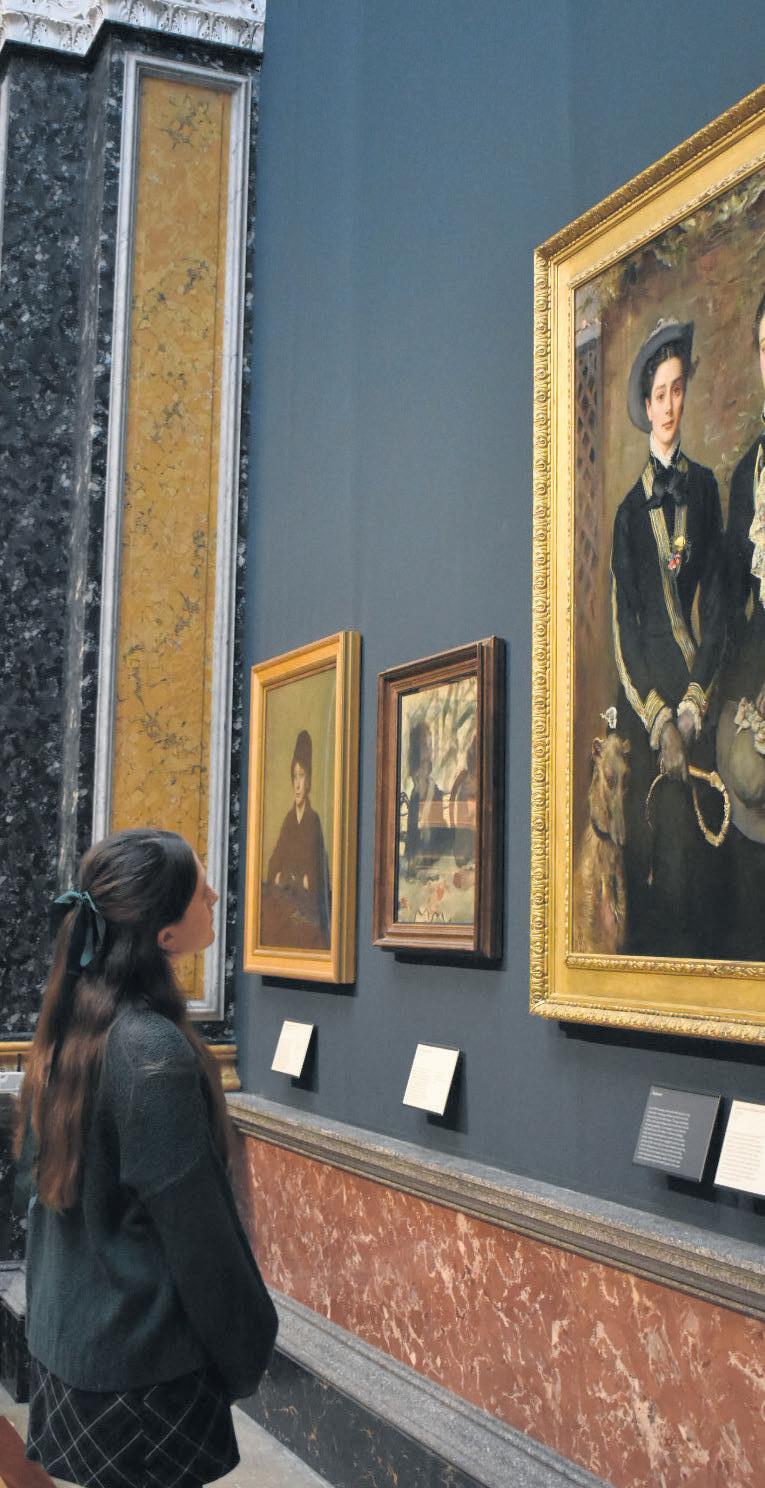


Week two has arrived and the chaos of Freshers’ Week clears, leaving most of us with residual sni es, a semipermanent hangover and a hoard of welcome emails from societies we don’t remember signing up to. As you settle into new routines, strengthen new friendships, and nd your new favourite seat in the library, we hope the pages of this edition spark inspiration and interest, even as the shine of a new term begins to wear. e gleaming optimism of a new term and a fresh start might have worn o by now, as supervision work ows in and we begin to regret trips to Wednesday Rumboogie. But the term is only just getting under way, and there’s still more than enough time to make the most of Michaelmas.
Once you nd out how to nally shake that freshers’ u (pg.19) and nail how to juggle long-distance relationships and the art of cooking in a gyp (pg.22), we hope you’ll feel
prepared to embrace everything Cambridge has to o er, from music nights (p.28) and tiny streets (p.24) to heroic librarians (p.18) and new theatre communities (p.30).
We constantly strive to provide you with the information you deserve to know about the city and the institution in which you live and work; sometimes this involves revealing the ways in which they don’t always serve the interests of our community. e sudden closure of beloved local shops (p.16) reminds us of the importance of standing up for this city we’re lucky enough to study in, and protect the parts that make it home. e organisations designed to provide students with support
sometimes fail to ful l that responsibility (p.4) and seem to make decisions against students’ interests (p.1). In the pages of this edition, we interrogate these failures, discussing with SU leadership how they plan to break out of a cycle of scandal and disillusionment (p.14).
ank you for spending some time with this issue, whether you approach this issue as a fresher settling into rst year, a nalist starting to think beyond university, a member of sta , or a local.

Find a little respite from your degrees and other stresses by cracking the sudoku (p.20) or discovering your new favourite song-sharing app (p.28). We hope you nd some enjoyment in these pages, and some inspiration to take into the trickier parts of the term.

editors Alice Mainwood & Grace Cobb editor@varsity.co.uk
deputy editors Matthew Taylor & Nick James deputyeditor@varsity.co.uk
vulture editors Lauren WelsbyRiley & Loveday Cookson magazine@ varsity.co.uk
news Wilf Vall & Sophie Denny (Senior); Anuk Weerawanda, Evie Selby, Hannah Gillott & Iris Rogers (Deputy) news@varsity.co.uk
investigations Esther Knowles & Omar Burhanuddin investigations@ varsity.co.uk
comment Hugh Jones, Maddy Browne & Max La Bouchardiere opinion@ varsity.co.uk
features Isabella Steinmeyer & Claire Gao features@varsity.co.uk
interviews Lauren Guye & Isabella Dowden interviews@varsity.co.uk
science Teymour Taj & Ruby Jackson science@varsity.co.uk
sport Romilly Norfolk & Will Jonas sport@varsity.co.uk
lifestyle Daisy Bates & Sophie Ennis lifestyle@varsity.co.uk
arts Felix Armstrong & Madelaine Clark arts@varsity.co.uk
fashion Annia Krzoska & Elsie McDowell fashion@varsity.co.uk
film & tv Xin Shackleton & Gina Stock lmandtv@varsity.co.uk
music Ezra Izer & Sharleen Opia music@varsity.co.uk
theatre Zach Lonberg, Elsie Hayward & Milly Kotecha theatre@varsity.co.uk
photography editor Holly Hardman
illustrations editor Jessica Leer
sub-editors Varun Ravikumar & Ellie Buckley subeditor@varsity.co.uk
associate editors Felix Armstrong, Hannah Gillott & Erik Olsson, associate@varsity.co.uk
business manager Mark Curtis business@varsity.co.uk




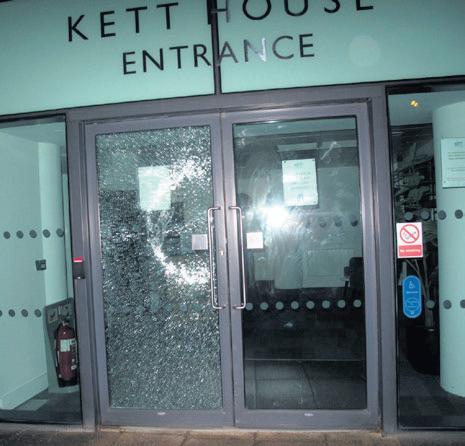
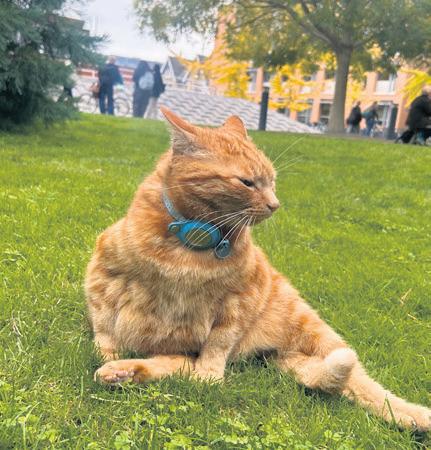
varsoc president Felix Armstrong president@varsity.co.uk
varsity board Dr Michael Franklin (Chairman), Dr Tim Harris, Michael Derringer, Mark Curtis (Company Secretary), Felix Armstrong, Erik Olsson-Ferrer, Hannah Gillott (Directors), Lotte Brundle (Guest) & Zoah Hedges-Stocks (Guest)









Felix Armstrong & Wilf Vall Associate Editor & Senior News Editor
A free speech organisation which declares itself an opponent to the “manyheaded hydra” of “cancel culture” has o ered to cover the security costs of Suella Braverman’s rescheduled talk at Cambridge’s Conservative Association.
Neither Braverman nor the Conservative Association (CUCA) have con rmed whether they will be taking the o er, but CUCA has told Varsity that they are “fully committed” to rescheduling the event.
e cost of security for the initial, nowcancelled event was reportedly quoted at £1,500.
e organisation, the Free Speech Union (FSU), is currently sponsoring “racerealist” fellow Nathan Cofnas’ lawsuit against Emmanuel College, his former employer.
Toby Young, FSU founder and an associate editor at the Spectator, told Varsity that the organisation is proposing to nance the event through its Ian Mactaggart Fund, which has funded multiple controversial student events in recent years.
e former Home Secretary was due to speak at a CUCA event last week, before the event was cancelled amid planned protests by student groups.
Announcing the event’s cancellation, CUCA cited “unprecedented security and logistical di culties,” while
Braverman accused student activists of using “threats, intimidation, and mobrule tactics”.

Daniel Zeichner, Labour MP for Cambridge, told Varsity a backbench Tory MP who appears to be courting media coverage. In my view she is best ignored.”
Braverman claimed that she was advised by police to abandon the visit, while Cambridgeshire police told the Sunday Times that the event was deemed to be “low risk”.























professor and member of University Council, also told Varsity: “Suella Braverman’s claim that she couldn’t speak at Cambridge because of ‘militant’ protest is a gross misrepresentation.”
Scott-Warren claimed that the former Home Secretary is “dedicated to crushing the right to peaceful protest,” adding: “that right is alive and well in our uni-



of a lm titled Birthgap — Childless World in Cambridge last year, Young told Varsity. e lm, described as “anti-feminist” by some students, blames the “pitfalls of Feminism and the modern dating-world” for “the planet’s collapsing birth rate,” and was met with student protest.
in, Young said, in which Cambridge sits second, the FSU having weighed in on 17 occasions, behind Durham with 22 cases. Oxford sits third on the table, seen by Varsity, with 14 cases of FSU involvement in free speech.
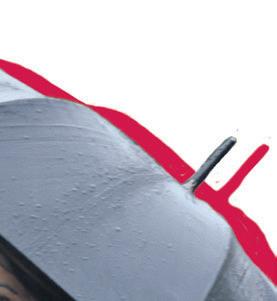
e Ian Mactaggart fund nanced security for a student screening
James Orr, a professor at Cambridge’s Divinity Faculty, sits on the FSU’s advisory council, alongside author Lionel Shriver and historian David Starkey. Last year, a member of the Faculty described Orr as “racist” following his comments about proPalestine protests.
In May, Suella Braverman visited the city’s pro-Palestine encampments, and told Varsity that she believes campus Gaza protests to be “antisemitic,” while Cambridge Jews for Justice said that “non-Jewish” politicians were using the protests to “weaponise [Jewish] identities”.


: “Suella Braverman is she that normal











The Organisation of Radical Cambridge Activists, one of the groups behind the planned protest, told Varsity the “supposed ‘security issues’ were unfounded, and mobilised to protect Braverman from scrutiny”. e planned protest fell “well within the normal right to freedom of assembly in the UK, despite Braverman’s best attempts while in o ce,” they said.
Cambridge Stop the War also criticised Braverman’s comments about the cancellation, telling Varsity: “There is no “mob rule”. We will not be intimidated by Braverman’s scaremongering.”








“intimidate”
Last week, Orr accused student protesters of attempting to “intimidate” Braverman, and attacked Labour for “betraying” free speech.
e Free Speech Union was established by Young in 2020, with the stated aim of “safeguard[ing] and promot[ing] free speech”. e organisation’s website claims that “cancel culture” is a “many headed hydra”: “every time we succeed in cutting o one of those heads, three more grow in its place”.
A University spokesperson told the Sunday Times that it would have “provided arrangements” had it been noti ed about the CUCA event: “ e university fully supports freedom of speech within the law, and recently implemented its policy on freedom of speech. We respect the right to protest within the law.” CUCA told Varsity: “We are currently having discussions as part of our e orts to reschedule the postponed event. However, no arrangement has been reached between us, Suella’s team, and any other third party. We are currently not able to comment on security arrangements or costs.”
Jason Scott-Warren, an English

Young told Varsity that the FSU has taken on around 3,000 free speech cases since 2020, about 20% of which have involved campus disputes.



e organisation keeps a ranking of universities according to the number of cases it has been involved
Toby Young told Varsity: “ e FSU has reached out to Suella Braverman and CUCA and o ered to pay the security costs if they’d like to reschedule this event.”
Suella Braverman was contacted for comment.
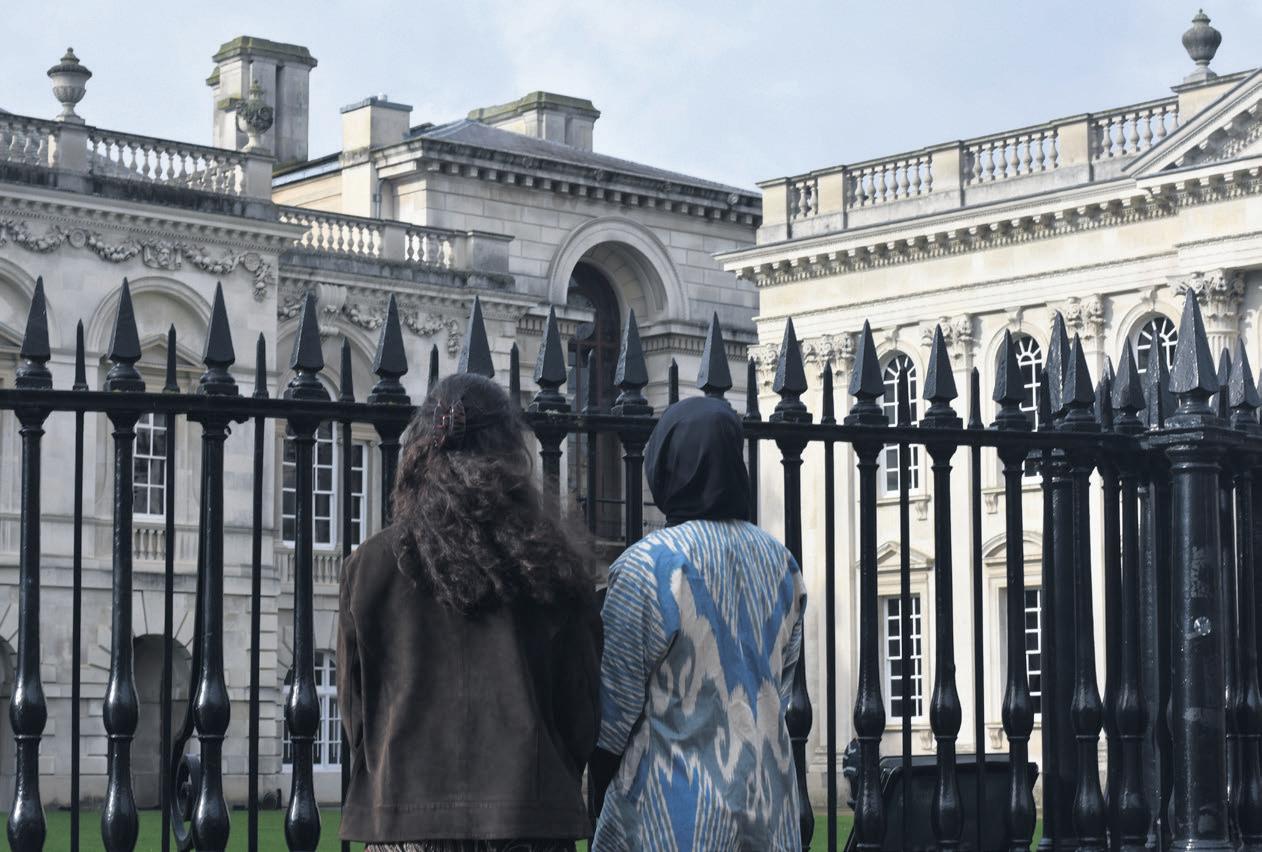
Wilf
Cambridge University has failed to condemn the Chinese government’s arrest of a visiting lecturer, despite calls from
academics to do so.
Members of the East Asian Faculty called for the department to make a statement on the arrest of Professor Rahile Dawut in China last year, after she was issued a life sentence for “endangering state security”.
When the issue was raised in a meeting last October, some members of the Faculty claimed that issuing such a statement “might a ect future visa applications for YA [year abroad] students or academic visits”.
e issue was then passed onto the Uni-
versity, with the Faculty stating that they “would be happy to help draft the statement if needed”. No statement has been issued from the University or Faculty since.
Rahile Dawut is a Uyghur scholar who was arrested in 2017 on charges of “a deliberate attempt to split the Chinese nation”. She had previously given lectures at Cambridge University as a visiting scholar.
Dawut is believed to be among more than 300 Uyghur scholars who are known to have been detained, arrested, and imprisoned since 2016, according to the Uyghur Human Rights Project (UHRP). An estimated 1.5 million Uyghur people have been detained in the Xinjiang province.
ere are about 12 million Uyghurs, mostly Muslim, living in Xinjiang, which is o cially known as the Xinjiang Uyghur Autonomous Region. Human rights groups believe China has detained more than one million Uyghurs against their will over the past few years in a large network of what the state calls “re-education camps,” and sentenced hundreds of thousands to prison terms.
e University has refused to reveal this information through Freedom of Information requests on two prior occasions. e minutes of the meeting were only disclosed in June following an appeal to the Information Commissioner’s O ce, which found the request had been wrongly rejected.
Calls to issue a statement came after multiple Universities issued condemnations of Dawut’s arrest. is included
the School of Oriental and African Studies in London, who gave her an honorary fellowship following her imprisonment. Dawut’s arrest was also condemned by the US government who labelled it as being part of a “broader e ort by the PRC to eradicate Uyghur identity and culture and undermine academic freedom”. is comes after Cambridge students launched a Uyghur Rights Campaign in Lent Term, accusing the University of “silence” over China’s treatment of Uyghur Muslims. is was followed by a separate article criticising conduct of Jesus College’s China Forum and its “treatment of the topic of China’s Uyghur minority”.
Uyghur scholars have been detained, arrested, or imprisoned since 2016, according to the
e China Forum previously hosted Professor Hu Angang, a Chinese professor from Tsinghua University, who the letter alleged had “in uenced” the ethnic policy of the Chinese Communist Party. e University has also been criticised over their nancial ties to the Chinese government after it was alleged they held “secret meetings” with the daughter of the former Chinese Prime Minister over a £3.7 million donation to the University. is donation was supposedly tied to the Chong Hua Professorship. e University of Cambridge was contacted for comment
e SU has called on colleges to prioritise the ‘care function’ of porters in recruitment and training, following a vote at student council
Sophie Denny Senior News Editor
e Cambridge Students’ Union (SU) has called on colleges to stop hiring porters from the police and armed forces over concerns of student welfare.
76% of those who attended student council on Monday night (14/10) voted in favour of the resolution. is comes after investigations have revealed longstanding student concerns about the behaviour of porters, particularly towards students from ethnic minority backgrounds.
The resolution, proposed by Rosie Freeman, women’s campaign chair, urges colleges to prioritise welfare in porter recruitment, and to “stop recruiting porters from the police and armed forces, recognising the care function of the porter and campaigning for colleges to recruit and train their porters accordingly”.
An investigation by the SU revealed that as many as 26% of porters currently employed by colleges were previously employed by the police or the armed forces.
In 2023 Louise Casey published a re-
view of the Metropolitan Police which found the force to be institutionally racist, sexist, and homophobic, with more than 1,100 serving o cers in England and Wales currently being under investigation for sexual and domestic abuse.
Since 2020, at least 18 colleges have received complaints about porter conduct, with students claiming that they have been subject to “racial pro ling” by their college porters. During a debate on the motion, SU Welfare O cer Esheni Eshete described the issue of racial pro ling as “such a point of contention for our students”.
According to an SU investigation, 18 out of 27 colleges provide training on Equality, Diversity, and Inclusion (EDI), while 12 provide mandatory Unconscious Bias training.
Both King’s and Caius College were the subject of a recent Varsity investiga-
▲ AMI KHAWAJA
tion into students’ experiences of discrimination from college porters. Caius, along with King’s, are among colleges providing EDI training.
One student claimed there were “very few colleges I’ve been able to go into without being questioned and basically harassed,” and reported feeling uncomfortable walking around without white friends.
tensive training on non-discriminatory practices” for college porters.




This investigation also cited an End Everyday Racism report which revealed that “racist incidents perpetrated by college porters” was a “repeated occurrence”. A second report in 2023 reasserted the importance of “ex-

13 out of 27 colleges provide mandatory Mental Health First Aid training, while fewer than ve provide dedicated training for student welfare issues such as drug and alcohol awareness, sexual harassment, and suicide prevention.
76%
Of student council attendees voted for the motion
e SU’s resolution recommends that the “care function of the porter” should be recognised in colleges’ hiring and training practices. Out of the 64 college porter recruitment documents published since 2020 and shared with the SU, only 24 mention student welfare or mental health within the responsibilities of the role. Further to this, only ve packs include welfare or mental health training as essential or desired criteria for the role.
is comes after multiple college porters came under re for racist and

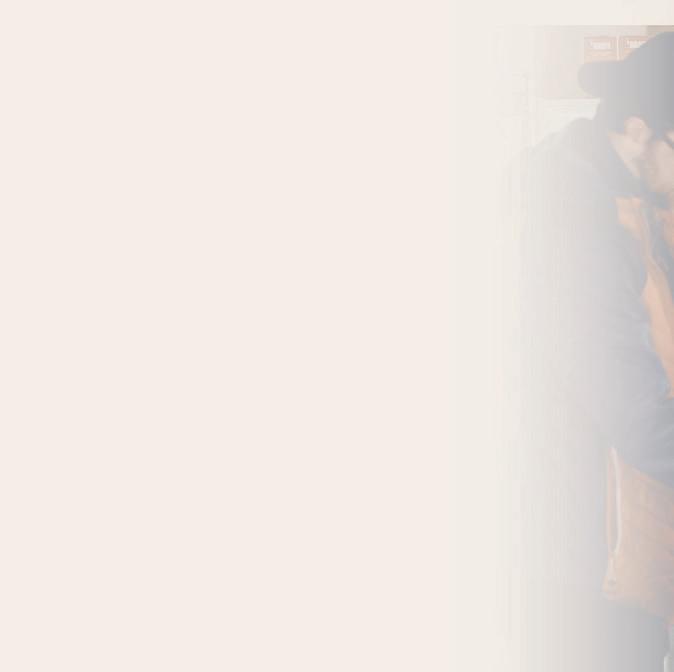
homophobic remarks online last term, with Emmanuel College SU labelling one porter’s conduct “homophobic and transphobic,” stating that they “completely denounce the reiteration of such views by a porter who is supposed to be a person of trust”.
A Gonville & Caius College spokesperson said: “Caius Porters are highly trained, respected and valued members of the College community from a wide range of work backgrounds. Any suggestion that a military or police background is a negative for a porter perpetuates an unhelpful stereotype and is false.”
A spokesperson for King’s College said: “‘Dignity at Work’ training is mandatory for all sta at King’s and focuses on equity, diversity, and inclusion within the workplace. Further training on a range of EDI topics, including unconscious bias, is also mandatory.”
“Porters are part of our security and welfare provision as they help ensure we have a safe living, working and learning environment for all members of our community,” they continued.
e University of Cambridge was contacted for comment.


Felix Armstrong Associate Editor
Pro-Palestine activists smashed the glass doors of a tech company’s Cambridge o ces early yesterday morning (17/10), accusing the multinational of complicity in “genocide”.
Siemens, whose Kett House o ce was targeted, is a German technology conglomerate and leader in Europe’s industrial manufacturing industry.
e activists claim that they targeted Siemens because of its “support [of] one of the most horri c genocides the world has ever seen”.
e protesters claim that Siemens provides “technological infrastructure” to Israel, saying that they targeted the company “because they are on the ofcial BDS list”.
e Boycott, Divestment, and Sanctions (BDS) movement calls for a total boycott of Israel, and lists companies which it claims are complicit in Israel’s “apartheid regime”.
e BDS website’s criticisms of Siemens focus on the Great Sea Interconnector, formerly known as the EuroAsia Interconnector, a submarine power cable which would link the Greek, Cypriot, and Israeli power grids. Siemens has been selected as the preferred contractor for the construction of the project’s converter stations.
BDS claims that the interconnector would “contribute to the maintenance and expansion of Israel’s illegal settlement enterprise” by transmitting energy
through the occupied West Bank, citing a report by the Palestinian Human Rights Organizations Council.
e development would allow “illegal settlements on stolen Palestinian land to bene t from Israel-EU trade of electricity produced from fossil gas,” BDS claims.
One activist behind the action said: “Over the past couple of days we have seen some of the most horri c videos of the last year of the attacks on the Gaza Strip and 76 years of occupation in Palestine, with people being burnt alive in a hospital, including a teenager called Shaban al-Dalou.”
“As Israel escalates its ethnic cleansing of the region, expanding from Palestine to Lebanon, we must also escalate in our resistance to it. […] We will see a free Palestine in our lifetimes,” they said.
e Prime Minister recently marked his “sorrow and grief” on the one-year anniversary of the October 7 attacks, when around 1,200 Israeli people were killed by Hamas, and 250 hostages taken.
e Israeli invasion of Gaza which followed October 7 has killed more than 42,000 Palestinians, according to the Hamas-run health ministry.
Lebanon has become involved in the con ict in the Middle East in recent weeks, after exchanging missile attacks with Israel. In recent days, UN peacekeepers have accused Israel of “deliberate” attacks on their base in southern Lebanon.
A spokesperson for Siemens told Varsity: “We are deeply concerned about the humanitarian devastation for civilians in the region and we support any action to avoid further escalation. In the strongest possible terms, we fundamentally reject any violence against innocent people and civilians.”
“Our deepest sympathy goes out to all those who have su ered casualties and injuries. We’re monitoring the situation in the region very closely and provide support to our people and their families,” they added.
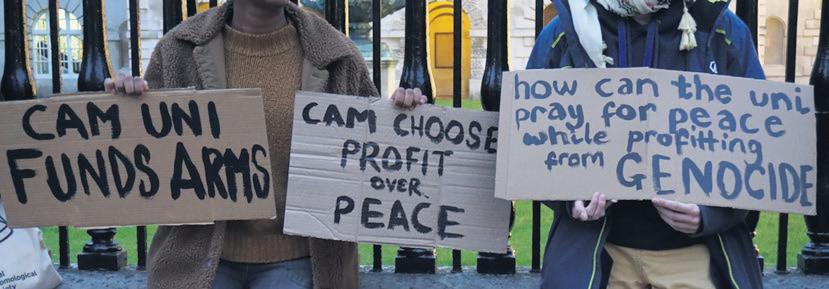
Hannah
Gillott Associate Editor
Cambridge has backtracked on a policy which would have regularised sta contracts — a decision the Cambridge branch of the University and College Union called “unfortunate”.
Cambridge’s Predictable Working Policy, which has now been withdrawn, stated that all employees and agency workers would have “a statutory right to request a predictable working pattern”. is would have e ectively banned zero-hour contracts for University sta — excluding circumstances where there is a “genuine business reason” for zerohour based employment.
Cambridge UCU has criticised the walk-back, saying it shows the University “has been reactive rather than proactive with addressing the signi cant problems that Cambridge has with job insecurity”.
A representative from Cambridge UCU told Varsity: “ is a ects sta wellbeing and is a detriment to the University not least through its impact on employee retention”.
“For the University to remain competitive we would like to see future policy revisions in this area to go further to address this problem than the minimum required to comply with UK law,” they continued.
Cambridge’s policy withdrawal came after the Labour Government decided
not to implement e Workers (Predictable Terms and Conditions) Act 2023 –which would have given workers the right to request a regular contract.
e University is not the only Cambridge institution facing criticism around precarious contracts. Earlier this month, Varsity revealed that the Cambridge Students’ Union (SU) advertised for a new team of sta under zero-hour contracts — despite having supported calls to abolish them.
e SU has previously supported the 2021 UCU campaign for “a framework to eliminate the use of precarious contracts,” and continues to support the Justice4CollegeSupervisors Campaign (J4CS).
Pauk Nowak, general secretary of the Trades Union Congress (TUC) has said banning zero-hour contracts should be a priority. “I would challenge any business leader or politician to try and survive on a zero-hours contract,” he said.
e University of Cambridge said: “As the legislation did not come into force, the draft Predictable Working Policy was not implemented, but we understand the government will be drafting new legislation in due course. In the meantime, we remain committed to fair employment practices and are actively exploring ways to support our casual workforce, provide exibility, and ensure more predictable work patterns for our sta , while balancing the needs of the University.”
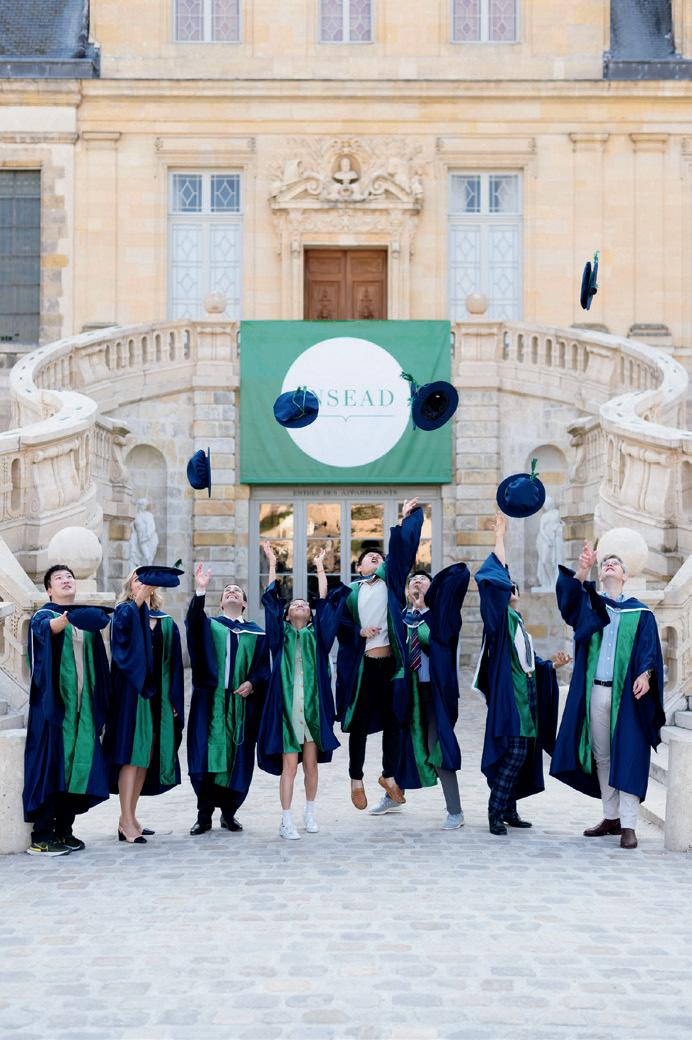






Felix Armstrong Associate Editor
Cambridge Students’ Union (SU) has backed a campaign to “challenge the insurance industry’s support of fossil fuels,” joining representatives of more than ifty UK higher education institutions to call on irms to stop insuring fossil fuel companies.
he campaign, Insure Tomorrow, is supported by the National Union of Students (NUS), and was recently launched at the NUS’ Ethical Financing conference, attended by Cambridge SU’s welfare oficer, Elleni Eshete.
he campaign aims to pressure universities to swap insurance providers and stop promoting careers in insurance companies that work with fossil
fuel companies. he industry earns over $21bn per year in premiums from insuring fossil fuels, they claim.
he group aims to use workforce leverage to push the industry to ditch fossil fuels: “Currently, the insurance sector is facing a signiicant recruitment crisis, and we plan to leverage this situation to compel these companies to act,” they said.
A spokesperson for the campaign told Varsity that insurance companies are “aggressively recruiting” from top universities such as Cambridge.
“We’re keen to see how students in Cambridge, and in the wider Russell Group, will react to awareness-raising eforts on the link between the insurance industry and fossil fuel exploitation,” they said.
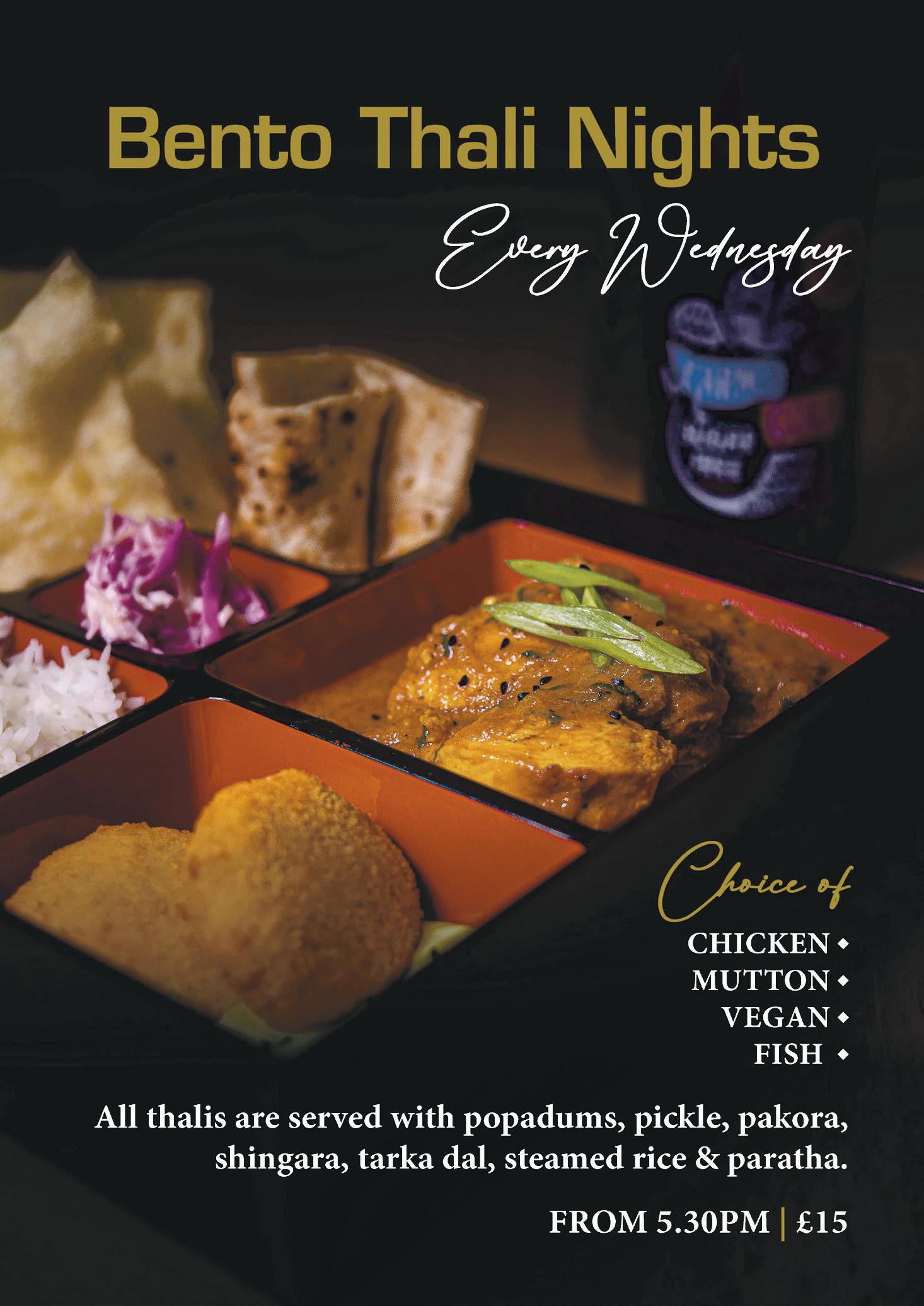
Elleni Eshete, speaking on Instagram on behalf of Insure Tomorrow, said: “his generation of students really care about people and the planet, and that’s worth investing in.”
Eshete told Varsity: “his initiative is a brilliant opportunity to help make sure that we as Sabbs are well equipped to go into important conversations in committees such as the Banking Engagement Forum, amongst others, with the right tools.”
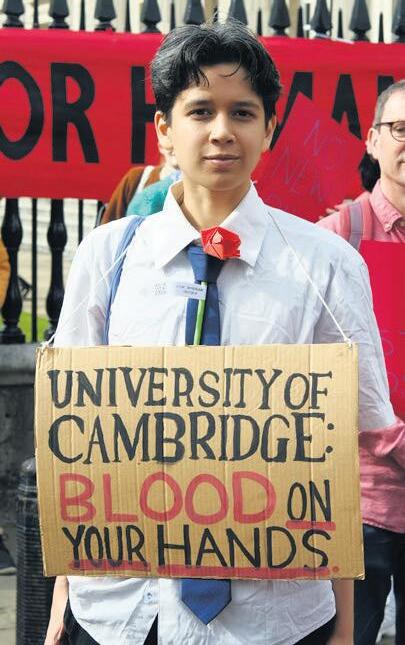
“In these meetings, we encourage the University to uphold its sustainability goals and encourage them to reconsider their working involvement with harmful and unsustainable institutions (particularly, in this case, those who insure new fossil fuel investments). We strongly believe in ethical and sustainable inancial practices which ensure that there will be a habitable and safe planet for future generations,” she said.
he campaign focuses on Lloyd’s of London, an insurance marketplace which insures 9% of the fossil fuel industry, according to Insure Our Future, an international campaign. he company has worked in partnership with Cambridge, having published research in collaboration with the University’s Centre for Risk Studies earlier this month.
Amira Campbell, NUS president and an Insure Tomorrow representative, said: “We believe that young people deserve a liveable future. Every industry has a duty — not only to the youth of today but to future generations who are yet to come.”
“What this campaign does is take an issue that is ordinarily perceived to be complex and makes it accessible for students to mobilise around. We now know who is responsible for climate chaos and we are not afraid to stand up against those who stand in the way,” she said.
Last year, Cambridge students joined Oxford and UCL in launching a “career boycott” of Barclays, refusing to work at the bank until it stops inancing fossil fuels. Cambridge University is currently considering ending its centuries-long partnership with Barclays, reportedly preferring banks which “do not inance fossil fuel expansion”.
he University of Cambridge was contacted for comment.
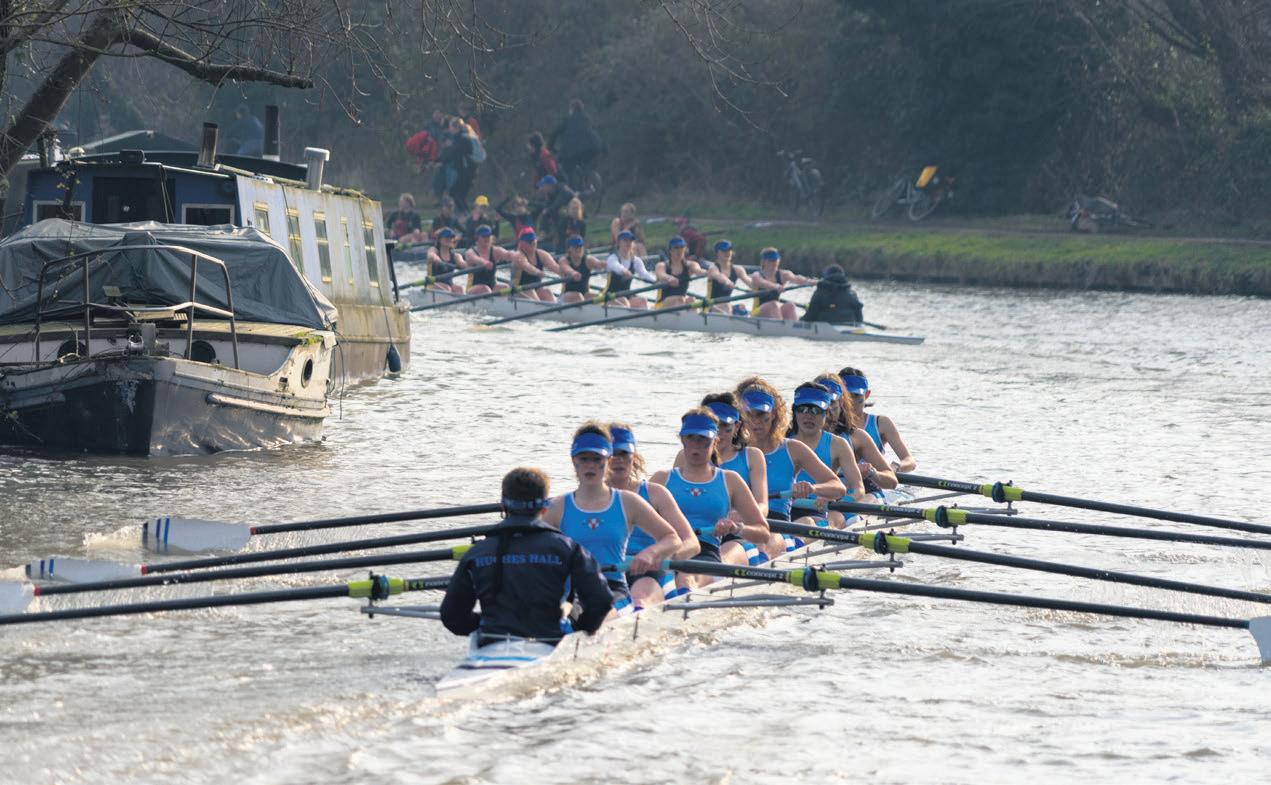
Iris Rogers & Sophie Denny Deputy News Editor & Senior News Editor
A controversial new rule has been intro-

duced by Cambridge University Combined Boat Club (CUCBC) which species separate outing times for novice and senior rowers.
e rule came into place on Monday (14/10), designating which crews can go
out on weekdays before 9am. Mondays and Wednesdays are allocated to novices, Tuesdays and ursdays to seniors, while Fridays remain unrestricted, allowing all crews on the water.
e changes come after a close vote
with a majority of one in favour of passing the rule.
e limitations were implemented “to keep tra c owing” according to the CUCBC website, with CUCBC Honorary Secretary David O’Loughlin saying: “Adherence to this rule will be enforced by the Early Morning Marshals”.
O’Loughlin also noted that the rule is “being trialled for Michaelmas Term 2024 and will be reviewed after Term.”
Other changes specify that “a minimum of half crew” should be rowing for the rst 15 minutes after boats are allowed on the water on senior mornings.
e new rules have faced backlash from college boat clubs, with Martha Wood, the Women’s and Non-Binary Captain at Magdalene Boat Club, stating: “ e new rule is making the already di cult task of scheduling outings harder, especially for smaller clubs with limited coaches and coxes.”
“ ere may be days now where some of our boats will have to go out unsupervised, which will undoubtedly slow their progress as a crew,” she continued.
Although the rules aimed to ease congestion, this has not been the case so far, with tensions between colleges increasing. Daniel Windridge Smith, Trinity Hall Lower Boats Captain, explained: “ e rule was made to ease congestion but so far has built up tension between boat clubs, with everyone
getting riled up at the slightest whi of someone disobeying the rules.”
He added: “ e lack of clarity on what quali es as senior boats and novice boats, each of whom are able to row on separate mornings, enables those with nothing of interest in their life save rowing (debateable if it quali es) to shout abuse at boats that don’t t into their little boxes of perfect rowing.”
Sam Moore, another Trinity Hall Lower Boats Captain, said: “ e new novice/ senior outing rules are already producing Cam calamity. Monday was the rst day of the rules and Trinity Hall Boat Club already received wrong accusations that they had sent out seniors on a novice day (sorry our novices are just that good!).”
“But beyond eagle-eyed Cam critics, ensuring novice rowers never have to experience the hell of a 6am wake-up post-Revs is probably a cause worth championing,” he continued.
Other rowers have taken to Facebook page Rowbridge Reborn to express their frustrations with the new rules, saying that it will become harder to teach novice crews with limited outings. ey have used the platform to suggest alternative solutions, such as smaller colleges pooling resources to reduce congestion on the river.
Cambridge University Combined Boat Club was contacted for comment.

































































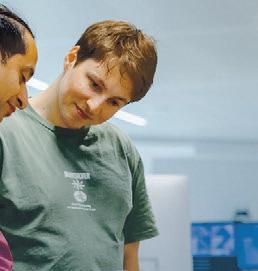

















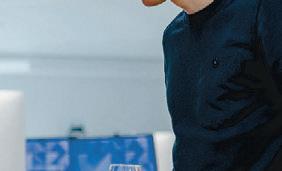






































e Cambridge Students’ Union, in a shocking and unprecedented turn of events, has abolished free pizza at student council meetings. ey have opted to replace it with an o ering of soup, following rumours that “nobody likes vegan cheese”. It is unclear if this change is a part of the SU's governance review. Abolishing pizza was not previously stated on their agenda, and the e ect of the decision on council turnout remains unclear.
Notorious Cambridge alumna Caroline Calloway caught social media attention for her antics amid Hurricane Milton. Refusing to leave her home in Sarasota, Florida, Calloway has instead been posting about the situation on social media. “So, if you’ve been following Hurricane Milton, um, I’m going to die,” Calloway said on a video posted to Instagram. “If I actually die in this storm, my books are going to go WAY UP in price,” she later wrote.
A plucky Cambridge student has thrown his hat in the ring for the Oxford Chancellor role, going up against former Conservative leader William Hague and New Labour architect Peter Mandelson. Francisc-Eduard VladoviciPoplauschi, a Girton undergrad, describes himself as “a poor immigrant and a passionate soul”. Making his plea he said: “I promise to give you anything you want, is this a bribe? O cially? No, but uno cially? Perhaps?”
Vice-chancellor Deborah Prentice has renewed calls for government investment in Cambridge research. Writing in the Times, Prentice claimed that “research-intensive” universities can be “genuine drivers of economic growth Following a pro-vice-chancellor's calls for government investment in a new science hub at the University, Prentice said that “no single US university” plays a similar national role to Cambridge's position in the UK economy.
SIMPLY PRESENT YOUR CARD IN STORE
WE ALSO STOCK A WIDE RANGE OF CAMBRIDGE RELATED GIFTS AND SOUVENIRS

Evie Selby gets across local Cambridge news
Ryan Gosling takes to Silicon Fens for sciick
Ryan Gosling has been in Cambridge to lm the new adaption of the 2021 space novel Project Hail Mary. Gosling stars in the lm as astronaut Ryland Grace alongside Sandra Hüller who plays Eve Stratt. e city makes an apt host for the sci- ick, given its reputation for cutting-edge tech research. e La La Land star has been spotted lming an action scene, running away from the University’s Mullard Radio Observatory with Huller while being chased by soldiers. e lm is based on a novel by Andy Weir, best known for his rst book e Martian, which was adapted by Ridley Scott in 2015. Project Hail Mary is set to be released in March 2025.
You spin me right round(about)
A new Cambridge roundabout has wreaked havoc on local drivers, due to its elaborate tra c lights. e project has been described by “bonkers” by one local, and the Times’ Laurence Sleator described the new road system as a “raw deal” for locals after sampling it. e “signalised roundabout was a part of the Milton Road Imporvement Scheme, which cost the Greater Cambridge Partnership £31.9 million.
Safety upgrade for busy Cambridge cycle route
Greater Cambridge Partnership’s executive board has approved work to make walking and cycling safer on the “busiest peak-time cycle route” in the city. Early work will begin on two areas of the Comberton Greenway: Adams Road and Coton Village. e carriageway will be resurfaced to establish a “cycle-street” that gives priority to cyclists and pedestrians over vehicles. Dan Strauss, a local resident, described Adams road as a “vital artery” for cyclists and pedestrians. He also noted: “When the engineering department lectures move to West Cambridge from the town centre, at a stroke, an additional 1,200 students will cycle and walk along Adams Road.”
Wilf Vall Senior News Editor
e HSPS faculty has been forced to revert to online exams due to “too many” of their students using arti cial intelligence (AI) in assessments.
First and second year HSPS students have been informed that their 2025 examinations for Sociology and Anthropology will be in person and handwritten due to concerns around AI.
When a member of the faculty was asked about the rationale behind in person exams in an introductory sociology lecture, they indicated that the change had been made because “too many of you guys were using AI in your exams”.


“rob you of the opportunity to learn,” and stated that “under no circumstances should the text generated by such AIassisted tools be presented as your own work.”
e letter also informed students that “zero-AI assessments (such as invigilated exams),” were being explored to prevent the use of AI in exams.
In March, a Cambridge study claimed to have discovered the “telltale signs” of essays written by AI. e study, conducted by Cambridge University Press and Assessment, compared ChatGPT assisted essays written by three university students to 164 GCSE essays.
with “however,” “overall,” or “moreover,” and frequently use numbered lists and latinate vocabulary. is research also found ChatGPT-assisted work performed poorly on analysis and comparison skills. e work performed well on information and re ection skills.
In 2023 a Varsity survey found that almost half of all Cambridge students had used AI to complete university work, with almost a fth of respondents having used AI to produce assessed work for their degree, such as coursework.
vised to use ChatGPT to structure coursework, as long as they disclosed that they had used it and included the prompts that they used.
In a meeting of the Teaching, Learning and Quality Committee in May, members of the HSPS faculty indicated that they desired to adopt typed in person exams, rather than handwritten, and would “continue to lobby the University,” for the resources to implement this change.
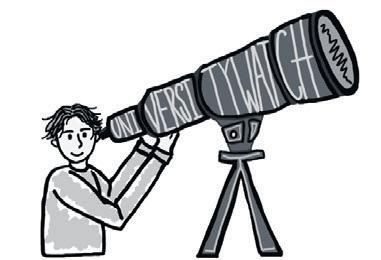



All part I and part II Sociology and Social Anthropology exams were in an online open book format last year.


e paper claimed that AI tended to start paragraphs







ird-year students will still continue to do exams online, and will have a longer window to complete them. ese exams will also be open book, with all others being closed book.







e move is designed to tackle the use of Generative AI models such as ChatGPT, which are language programmes capable of producing academic pieces of work.





Earlier this year, the HSPS faculty published an open letter calling on students to reject the use of Generative AI in academic work as it threatened to

Cambridge currently has a total ban on the use of AI technology in assessed work, treating it as academic misconduct, but use guidance for non-assessed work varies by department.
English students were told in Lent term that AI can be useful for “sketching a bibliography on a given topic” and “assist[ing] early stages of the research process,” but this should be done in consultation with their






Last term, second-year English students encountered signi cant technical issues while taking an in person typed exam while using an examination software called Inspera. During the exam, students were unable to complete the second section of their paper, and many found that their essays had been deleted.
Evie Selby rounds up student news from around the country
Oxford clamps down on protest?


Some rst year engineering students had also been




Dr Andrew Sanchez, Chair of the HSPS Tripos Management Committee, said: “ e HSPS faculty has implemented in person, handwritten exams for Pt 1 and Pt 2a HSPS students for Sociology and Social Anthropology papers. is decision responds to concerns around the use of AI in online examinations, and follows discussion within the HSPS faculty and Tripos Management Committee last academic year.”
“ roughout this process, the feedback of student members of the Tripos Management Committee has been sought, and those members have been briefed on any changes,” he continued.
Lily Kemp News Correspondent
Some courses in Cambridge have an awarding gap as high as almost 17 points, Varsity can reveal.
Freedom of information requests of 2024 exam results found that male Astrophysics students on the Natural Sciences tripos scored on average 16.8% better than female students.
Another subject with the signi cant awarding gaps include Archaeology, with a 6.96% di erence. For students studying the eology Part IIB, the average male student received 71, whereas the average female received 66.
Another signi cant awarding gap was in Education where male students on average received 70, whereas female
students received an average of 67. is is despite the cohort being made up of 82% women.
In the 2023 exam cycle, female students were 8% less likely to receive a rst, marking a continuing trend of women getting fewer rsts than men since 2011.
is comes after the University recently decided to exclude the gender attainment gap in its access report. is was due to the O ce for Students not considering a disparity between attainment of “good honours” (a II.i in comparison to a rst) an awarding gap.
In May, a University spokesperson told Varsity about the decision to omit the gap from its access plan, stating that “just because a target isn’t included doesn’t
diminish the University’s dedication to tackling certain issues,” and claiming that they are carrying out “extensive research into this persistent gender awarding gap”.
e gender awarding gap will be incorporated into the University’s Athena Swan action plan, which will be used across the sector to support and transform gender equality.
26 out of 58 subjects showed a higher average mark for female identifying students.
Rosie Freeman, Chair of the Cambridge women’s campaign told Varsity: “Now is the time for the University to move beyond vague commitments in favour of practical, well-funded and student led strategies”.
“ e undergraduate Gender Award-
ing Gap is a very real issue and beyond the statistics we have to investigate how this may act as a barrier to academic progression and how this gap is experienced daily,” she continued.
e cohort size of the Astrophysics track is not publicly available, however the Natural Sciences tripos it is a part of is made up of 52% men.
A spokesperson for the University of Cambridge told Varsity: “ e University is conducting thorough research to understand the causes of the gender awarding gap and has established an institutionwide project to bring this together in one place. e gap is also being examined as part of the teaching review and the University will be making a public commitment to closing it.”
Academia is a space that has always been male dominated, the legacy of which we cannot get rid of overnight. e fact that male students continue to achieve higher in female dominated courses shows how deeply rooted misogyny is within our academic spaces. Writing in a more stereotypically masculine way is something many degrees attempt to teach young women, from
individual word choices to structuring arguments ‘like a man’. It was one thing for state school targets to be scrapped by the University earlier this year, but that they didn’t bother to mention the gender attainment gap in the Access Report says everything we need to know about their priorities. ey may not know how to handle the problem, but the obvious solution is not to exclude
the data from their reports and sweep it under the rug. Making sure our supervisors and the people grading work are trained in implicit bias, or even releasing data on the gender demographics of supervisors could be places to start; not trying at all is not an option. e sheer amount we pay for our degrees warrants fair treatment, especially when receiving nal grades. When we consider the
impact of the gender pay gap in determining our ability to pay these loans back this becomes doubly important. e University must provide academically rigorous, but most importantly, fair feedback and grades in all cases. Women still being hindered in academia is not a surprise, but Cambridge’s complete dismissal of the issue remains a predictable disappointment.
Oxford University has rewritten its protest policy, encouraging students to keep demonstrations “within the limits of the law”. e rules prevent protestors from interrupting teaching, occupying University property, disobeying reasonable instruction from proctors, and refusing to identify oneself to university sta . Breaking these rules could be punished by warnings, nes, or suspension. Oxford Action for Palestine (OA4P), who staged a pro-Palestine encampment last term, has accused the University of changing the rules to limit protest.
Buckingham vice-chancellor suspended
Professor James Tooley, University of Buckingham vice-chancellor, has been suspended after “a number of serious allegations”. Students were told that an inquiry would be taking place to determine the truthfulness of currently unrevealed claims against Professor Tooley. Students were told to “refrain from contacting the vice-chancellor on this or any other university matter”. In February, Tooley claimed that Cambridge's admissions system is discriminatory” against white, privately-educated students.
Bristol University slammed for tuition fee hikes
Students have slammed Bristol University after it increased Master's tuition fees by 50%, only to lower them the following year. e annual cost of an anthropology Master’s degree at the University increased from £11,000 in 2022/23 to £16,500 in 2023/24, before reducing to £14,000 for 2024/25. A group of the University’s Master's students have launched a campaign accusing the University of “unfair pricing”. Lola Karpf, one Master's student, said that “it’s crazy that they are raising prices so randomly,” labelling Bristol's treatment of fees “really de ating for us, especially during a cost-of-living crisis”.
Omar Burhanuddin Investigations Editor
Both Trinity and Sidney Sussex awarded one of their students a travel grant worth over £5,000, Varsity can reveal.
In the 2023/24 academic year, the largest individual travel grant Trinity College awarded was worth £5,160. During the same year, Sidney Sussex College awarded an individual grant worth £5,250. hese indings come after an investigation by Varsity into grants awarded by colleges to support student travel. Students at Cambridge, both undergraduates and postgraduates, can apply for these grants for various academic and non-academic purposes, including for research, conferences and recreation. However, there are wide disparities between the amount each college spends on travel grants.
A summary of the indings for the 2023-24 academic year can be viewed
below. he igures in brackets on the left axis indicate the number of students at each college who received one or more travel grants. he total sums of Hughes Hall, Newnham and Wolfson Colleges are incomplete or provisional, since in these cases not all applications have been considered or grants claimed. hey have therefore been marked with an asterisk.
Five Colleges — King’s, Newnham, Peterhouse, Queens’ and Trinity — spent over £100,000 on travel grants during the last academic year. Trinity, the highest spending college, forked out £188,009.67.
In the 2023/24 academic year, 11 colleges awarded individual grants over £2,000. Trinity and Sidney Sussex College both awarded an individual grant over £5,000.
By contrast, two colleges — Hughes Hall and St Catherine’s — spent under £25,000 on individually named travel awards last academic year.
In the last two academic years, Murray Edwards and Fitzwilliam Colleges
awarded travel grants to every student who applied for one. Meanwhile, every student at Clare College can claim up to £300 over the course of their degree for summer travel. A student at Clare, who received funds to visit Florence for a language course last year, considered the college to be “pretty generous”, adding that they were “really pleased with the funding and felt that my College was very supportive and happy to help”.
Calculating the average amount that students from each college receive in travel grants is a diicult task. he grants each College awards can vary substantially in value, and a few unusually high awards can skew the average above the value of a typical grant. In addition, students can receive more than one grant each year.
he disparities in spend between colleges can be explained in part because colleges with more students often receive more applications for travel grants, and award more grants as a result.
However, this explanation does not always apply. In the 2023/24 academic year, Peterhouse (one of the smallest Colleges by student population, and wealthiest by assets per student) distributed £107,629.59 in travel grants between 194 students. In the same year, Lucy Cavendish College distributed £46,244 between 258 students.
Some students Varsity spoke to believed the amount each College spends on travel grants could be explained by other factors. A student at Christ’s who received £100 to support a trip to Paris (which was less than they applied for), argued that “the College’s ability to give grants is partly inluenced by its inancial position [...] many of the grants at Christ’s are funded by donations from alumni for the intended purpose of travel”.
Travel grants can also have unusual criteria for students to be applicable for funding. St John’s maintains its C.W. Brasher Fund, Roger Chisholm Fund, and Ulysses Travel Fund to enable students

to travel, respectively, to “a wilder part of the world”, “wild places,” and “more remote parts of the world”. Trinity holds the Field Fund, grants from which are awarded with a preference to students who are direct descendants of a speciic college alumnus’ relative.
£188,009
Total amount Trinity spent on travel grants to students during the 2024-24 academic year
£5,250
Largest individual travel grant awarded to a student; the grant was given by Sidney Sussex College
When asked about the amount King’s College spent on travel grants, a spokesperson for the college replied: “Student travel grants at King’s are funded entirely through a philanthropic donation made exclusively for the purpose of supporting student travel. It covers all forms of travel for our undergraduate and graduate students, including promoting green forms of travel and always paying carbon ofsets.”
he spokesperson continued: “he amount includes support for undergraduate student travel while undertaking a year abroad, and for graduate students who may have been studying abroad, conducting ieldwork, or attending conferences. he fund also supported a pilot internship for six students at a major international policy conference in the USA.”
Meanwhile, a spokesperson for Murray Edwards College said: “College travel awards make a positive contribution to student life across the University. At Murray Edwards, we are pleased to be able to support so many members of our student community in funding travel for research and personal development. Students tell us how important these grants are in enabling them to undertake trips, research and internships that would otherwise be out of reach inancially.”
A spokesperson for Trinity College also said: “Trinity College continues to do everything it can to support its members, and students and researchers across the University of Cambridge and its Colleges. In 2023-2024, Trinity spent more than £10 million in support of the Collegiate University, particularly through research and studentships, and via contributions to other Colleges.”
A full list of igures were not obtained for Clare, Corpus Christi, Darwin, Downing, Emmanuel, Girton and Robinson Colleges. Colleges can occasionally redirect applications for other types of grant, such as hardship funds, to travel grants. hese redirected grants have also been included. All relevant colleges have been contacted for comment.
Studentships cover full tuition fees plus an annual stipend
Search LSE PhD funding to ind out more

Apply for a PhD by 15 January 2025 or 1 December 2024 for Law and 18 December 2024 for Economics and International Development to be considered
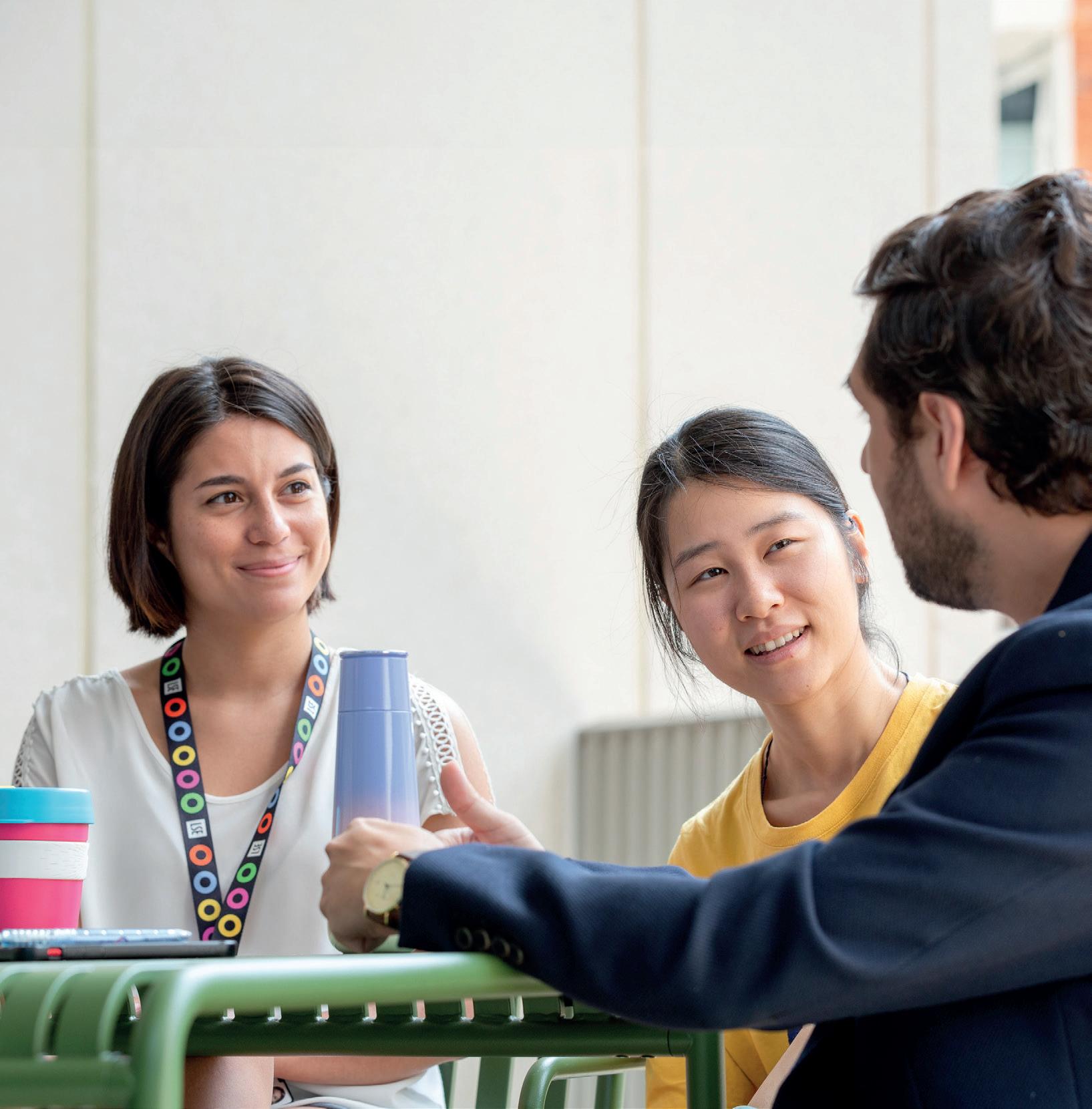
On October 12th, Keir Starmer celebrated his 100th day in o ce, over three months since Labour’s landslide victory on July 4th. At breakfast on that July morning, the mood was expectant, despite the seeming inevitability of the election results.
While Labour celebrated a historic victory, when it came to youth voter turnout, the situation has signi cantly worsened. Only 37% of eligible 18–24 year olds voted, down ten percentage points since 2019 and much lower than the still shocking national turnout of 60% (only taking into account registered voters).




Looking ahead now, the probation period is certainly over for Starmer. ese
statistics might suggest that us students and young people wouldn’t be paying much attention. Yet, as our writers are proving, in order to interest political parties in the youth vote, we have to engage in politics. Even if, as Varsity reported, a third of Cambridge students don’t take out the tuition fee loan that the government is raising, these policies a ect a majority of us.
Each of the writers printed here are weighing in on the government’s record so far, from “freebie-gate” to the means testing of the winter fuel allowance. Each represents a di erent student opinion, as we navigate a political sphere that historically under-represents our needs. eir snapshots also allow us to con-
sider how Starmer as a gure is continuing the recent ‘presidentialisation’ of British politics.Yet, this time will quickly disappear. In these nal weeks before the Budget, there is a sense that the public have taken their own snapshot of Starmer’s performance so far, and anxiously looked ahead to the next ve years.
Starmer’s rst 100 days as prime minister were meant to establish Labour’s competence and build public trust after 14 years of Conservative rule. Instead, his government has stumbled into an unnecessary crisis of its own making. Choosing to target pensioners’ winter fuel payments in the opening act of his premiership reveals a misreading of both political timing and social priorities. To me, the rushed proposal demonstrates economic orthodoxy, particularly through cuts to vulnerable groups, and raises serious questions about whether Starmer’s Labour has learned the right lessons from its years in opposition.
In a move that can only be described as a betrayal of Labour values, millions of pensioners are set to lose their winter fuel payments after a shameful vote in Parliament. e government, with Labour at the helm, won the vote to restrict these crucial payments by 348 to 228 — a majority of 120 that speaks volumes about the party’s departure from its roots. As a politics student and resident Westminster enthusiast, I’m appalled by the way Labour MPs are being held hostage by their own party whip. It’s a disgrace to the principles of representative democracy and a slap in the face to every constituent who voted for change and compassion.
52 Labour MPs didn’t even participate in the vote, including seven ministers. While we don’t know for certain how many deliberately abstained, the numbers suggest a party that has already begun to alienate its own MPs, and already revealed how dangerous the tight grip of party whips could be.
In what should be a badge of honour but is instead a lonely stand, only one Labour MP, Jon Trickett, had the guts to vote against the government. Trickett rightly pointed out that for his constituents, this could “be a matter of life and death”. It’s a damning indictment of the party that only one of its members so far was willing to put constituents before
❝ One can witness the corruption of representative democracy in real time
career. is isn’t just an isolated incident from Starmer’s governance, the whip has been removed from Zarah Sultana after she took a stand over the two-child bene t cap.
e party that once prided itself on standing up for the vulnerable is now complicit in pushing them further into poverty. It is a bitter pill to swallow for anyone who believed in Labour’s promise of a fairer society, only three months after their landslide victory. is vote on winter fuel payments isn’t just about keeping pensioners warm, it’s also about maintaining the warmth of compassion that should be at the heart of Labour’s mission.
e grip of the modern whip system exempli es how parliamentary structures can breed career politicians at the expense of genuine representation. e winter fuel payment vote under Starmer’s leadership serves as an example of this de cit. When MPs prioritise their standing with party leadership over their constituencies’ needs, one can witness the corruption of representative democracy in real time. e whips’ in uence has, for a long time, created an incentive structure where political survival depends more on party loyalty than constituent service. is dynamic was evident in the recent vote, where dozens of Labour MPs who likely har-
boured private reservations about cutting winter fuel payments chose either abstention or compliance rather than risk their political futures.
e fact that only one Labour MP felt empowered to vote against the measure speaks volumes about how the whip system has evolved from a necessary tool of party management into an instrument of suppression that sti es the very essence of parliamentary democracy. Starmer’s approach to this vote suggests his premiership may further entrench this problematic aspect of Westminster politics, where career advancement hinges on conformity rather than conviction.
▼ RUYING YANG



With designer dresses, luxury penthouses and Taylor Swift, “freebiegate” has all the ingredients of a great tabloid story. Instead, it has enjoyed near-permanent residence on the front pages of our broadsheets for an entire month. If the scandal was Labour’s rst test of media management, then they have utterly failed. It has felt as if Downing Street is batting against its own players, with Starmer changing his story even more often than he changes his designer glasses. But, much more precious than any number of free football tickets or expensive clothing is voter trust. If we’re not careful, the opportunity for long-term structural change will be defeated by tabloid fodder. Don’t get me wrong, the optics of freebie-gate are terrible. Accepting a plethora of donations with one hand, whilst means-testing a vital winter fuel payment with the other is not exactly a foolproof PR strategy. Labour was so xated on rigidly following the donation rules that they failed to grasp that the real hurdle is always the public smell test. Unlike Starmer’s gifts, voter mistrust is often non-refundable.




IT❝
Who seriously thinks that the knighted, former director of public prosecutions is just a regular bloke?
ere is always a di erent standard in government than opposition, but Labour has struggled to track the public mood. When Starmer was pictured at Taylor Swift’s sold-out Wembley gig this June the question on nobody’s lips was “who paid for that? . Instead, he gleefully told reporters that his favourite Swift song was ‘Change’ (Taylor’s Version I hope).
But any Labour honeymoon is well and truly over. Science and technology secretary Peter Kyle now claims the government is “updating the rules” of donations to meet the public’s expectations of standards in o ce, but this appears to be too little, too late. A damning new YouGov poll shows that already the majority (54%) of Brits believe Labour is “sleazy,” with 1 in 4 claiming that Starmer’s conduct in o ce has been worse than former partying PM Boris Johnson. Whilst the Tories are undoubtedly sitting smugly at the minute, this is good for no one. Against the backdrop of rising populist sentiments across the UK and Europe, having a credible government that voters can trust is in all of our interests.
Perhaps what is most fascinating about the scandal is the extent to which it demonstrates our values-based poli-


he promise of an honest government rang clear in Labour’s electoral campaign. Calls to ‘End the Chaos’ resonated with many; a new ‘Ethics and Integrity Commission’ appealed to those voters becoming increasingly apathetic amidst a barrage of Tory scandals (need I remind you of the details?). An alternative to the sleaze of past governments undoubtedly played a central role in this campaign. Yet, what we are now presented with is not the alternative Keir Starmer was hoping for.




Rosie Du eld recently became the fastest MP in modern history to resign following a general election victory, claiming Starmer and his inner circle had “tarnished and humiliated” others in the Labour Party. is came after it was revealed that Starmer had accepted more than £100,000 of gifts in recent years.
on both giants in our two-party system. Labour cannot a ord any depiction as a party of sleaze. It is simply unsustainable. “Freebie-gate” does have important implications on the image of the Labour Party that cannot just be ignored. Freebies, however insigni cant to some, sear an image of insincerity into the eyes of the electorate, an electorate already lled with the sleazy, untrustworthy image of the modern politician.
After some rather staunch defending of his actions, Starmer has nally decided to










f we thought a “week is a long time in politics,” then 100 days seems to be a whole new era.
Indeed, many voters hoped it would be, after 14 years under Conservative rule. ere is also a fear conveyed by our writers that, in reality, this new era hasn’t changed the political system itself much at all. If Starmer really wants to sing the song ‘Change’, he needs to understand how the public has grown tired of pointing the nger at the Tories as an obstacle







In this instance, the scandal may have been the straw that broke the camel’s back. Dufeld was an ardent critic of Starmer, already on the cusp of leaving the party. Nevertheless, I believe that the most interesting observation to come out of all this is one that focuses on the wider e ect














to that change, whether they deserve it or not.
ese student accounts re ect a common pattern, of a politics that is still all about appearances. As Luca Chandler argued, Labour cannot a ord to be seen as the new party of sleaze, however ruleabiding they actually are. In Sam Moore’s piece, we see how the public also cannot forget how their predecessors spent 14 years breaking the rules. Yet, voters are right to see Starmer as a fresh start and re-evaluate how they view those rules.


























tics. Freebie-gate is a story that would hardly make it out of an American newsroom because there just isn’t that same level of cynicism towards money across the pond, or amount of transparency laws. America’s economic divide is even more stark than in Britain, yet they look to politicians as symbols of aspiration rather than for relatability. Our desire for politicians who can relate to us is understandable, but who seriously thinks that the knighted, former director of public prosecutions is just a regular bloke ‘toolmaker’!





If we want public gures to pass our test of ordinariness, then they need the institutional framework to do this. Take the PM’s spouse. Unlike in America, they occupy no o cial role or o ce, except all the same fashion and lifestyle expecta-

back more than £6,000 worth of gifts and hospitality received since becoming prime minister. is included the covering of costs from six Taylor Swift tickets to designer clothing rentals for his wife, Victoria Starmer. is may have been the right course of action, but this issue is rooted far beyond the details of his deeds.


tions still apply. Ultimately, if the public disagrees with the private donations that aid this task, then we ought to adjust our expectations. e other alternative is putting a separate clothes budget on the public purse, but that would be
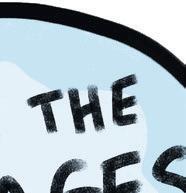








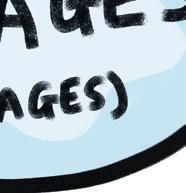














Labour have not always been the party of good ethics that they are now seen as. eir image during the years of New Labour was hardly up to par (looking at you Mandelson), being hit with successive scandals during their 14-year tenure in government. However, I am rmly of the belief that Labour is held to a signi cantly harsher ethical standard than their Tory counterparts.






ere has been a distinctive cultural shift within both parties in the contemporary political landscape one that, I believe, has created contrasting
Starmer’s Labour can only enact the policies that will (hopefully) solve their image problem if they have e ective party dissent, as Fatima Zahra Yusuf addresses. I think that the winter fuel payments should have been means-tested a long time ago, but reduced gradually with input from constituents. Nevertheless, this cannot happen until the structural and cultural reforms are enacted in Parliament that would allow MPs to properly engage with the legislative process without fearing for their careers.




❝ Labour is held to a signicantly harsher ethical standard than their Tory counterparts




e next 100 days return to our prime minister himself, as he prepares for the Budget, perhaps even with Taylor Swift playing in the background. As our writers have demonstrated, Starmer needs to tackle not simply how he and his Cabinet are viewed by the public, but how they can help their MPs make ‘Change’ from the ground up, to help all of us.











Either way, the real danger of this scandal lies in conflating the rule-adhering ceptances of the Labour government, fest under the ministrations. is is ory that we have a Labour government,






tural reform will dry up if we validate the media’s nit-picking. Labour deserves an opportunity to drive real change without us turning up our noses at the rst whi of hypocrisy.

spaces of scrutiny for each party. Whilst the general public has unequivocally rejected sleazy governance electorally, the Tories’ culture war rhetoric has allowed them to position themselves as the party who does not have to hold themselves to the same, demanding ethical standard that Labour MPs may have to be subject to. A rejection of the wokeness of the social media masses carves a new space of obfuscated accountability for the Tories to hide under.
As such, Labour is left vulnerable. Progressive politics is, by nature, reliant on transparency and responsibility. Coupled with a culture of the almost-dystopian transparency of ‘cancel culture’, the bar of ethical standard is raised. Labour, attempting to meet such a high bar, are left in a predicament that could lead them to electoral collapse. A Starmer-ite Labour that captures the headlines with sleaze and corruption is one that soon nds itself returning to the opposition benches. A battle of image is commencing in the Commons. e rst 100 days of Starmer have only regurgitated the same story of mistrust that de ned the previous government. He preaches patience, saying that this di cult transition will take time. But, if he wishes to enact meaningful change from “14 years of Tory chaos” he must steer well clear of sleaze. As a man who loves a good Uturn, turning the ship 180-degrees away from scandal should be his priority.
The Cambridge Students’ Union (SU) is in a bad way. Last year, former Undergraduate President Fergus Kirman stated that the institution was in “a pit” that they needed to get out of following a string of scandals. Fast forward 12 months and half of the Sabbatical team had resigned, one of its presidents was on hunger strike accusing the institution of “killing democracy” in Cambridge, multiple members of SU sta claimed the institution fosters a culture of racism, corruption, and bullying, and an emergency meeting was called after a petition accused the SU of a “failure to adhere to its own constitution”. e pit had got a whole lot deeper.
e new Presidents, Sarah Anderson (undergraduate) and Sumouli Bhattacharjee (postgraduate), aren’t shying away from this reality. “We ran for our positions in February before Easter Term had happened, and things were obviously a lot di erent then,” Anderson states, acknowledging the strife that had come before her: “ ere were moments in Easter term where I was watching that sort of stu coming out and being like, ‘Oh my gosh, what am I getting myself in for?’,” she






ing out “the job as an SU Sabb is not just another job right? [...] it takes a bit more conviction and sense of purpose,” that is needed in the role for them to make genuine change. He’s positive about the new team too, claiming that in “every single one of them [the Sabbs] you see that sense of purpose”.
❝
ey want to tackle the problems that have plagued the SU since its inception
It’s nice to hear, and probably bene cial to students if there’s less mudslinging, hunger striking, and secretive Moroccan holidays from the Sabb team. And while this does take more than having a group that works together to be e ective, it’s de nitely an important starting point.
It hasn’t all been roses for the new team; Manjari Gupta, the women’s ofcer elect couldn’t join the team due to visa issues, and disabilities o cer Chalo Waya was unable to take up his post until recently due to a holdup on PhD funding. e presidents do seem con dent that the new team will have a longer life expectancy than their predecessors, both nodding along with uncomfortable smiles when asked if they’re hoping to avoid the slew of resignations that coloured last term.
how their backgrounds will help in reforming the SU.
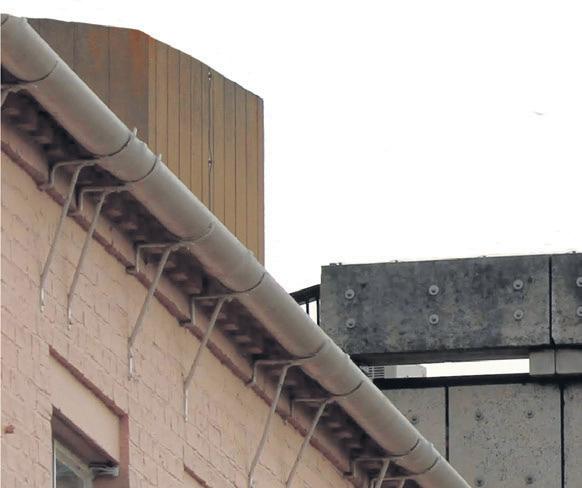

“It’s a really nice size of group, I think, six people,” Anderson re ects on their situation, with Bhattacharjee claiming that what they lack in numbers they make up for in a “diverse,” group of skills that can help them achieve their priorities. “Sumouli has had a real life jobs, [...] his knowledge, speci cally ethical issues and divestment and all this kind of stu that are really important issues for students right now, it’s valuable having someone who’s lived and breathed that for years of their life in the role”. Bhattacharjee has similar praise for Anderson’s skillsets noting how “She’s the student democracy expert on the team,”
for? ,” adds. e pair insist they were not put off by this mess however, with Bhattacharjee pointe with the pair asserting

Harmony between the Sabbs is something that Anderson is keen to emphasise too, noting how attempts to promote a “positive vibe” in the team has “come from the organisation realising it’s really important for the Sabb team to get along with each other”. e pair pick out a trip to a board games cafe and a game of “drawing Chinese whispers” as an especially good memory, and Anderson praising the fact that the team have had so many “amazing bonding opportunities”.
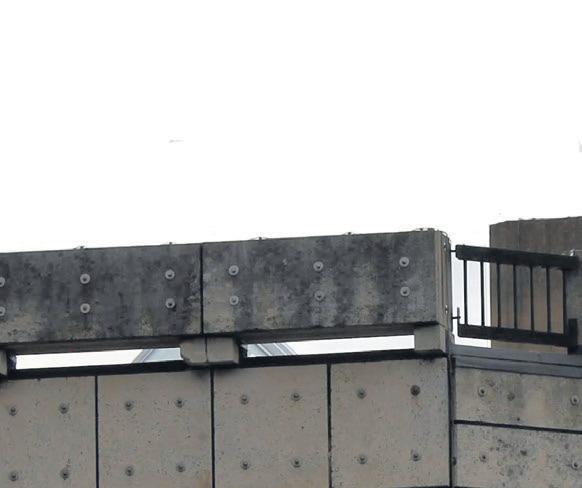
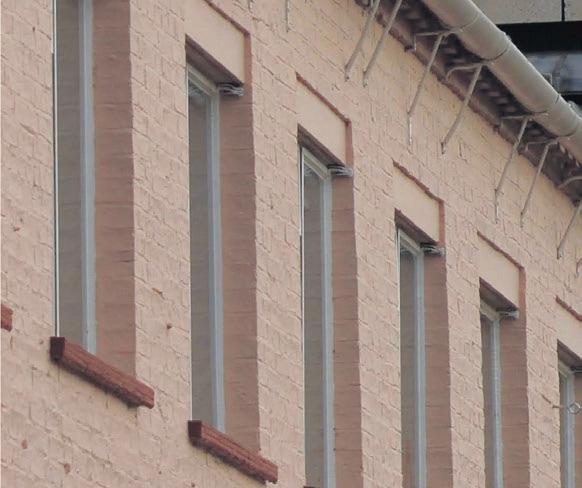
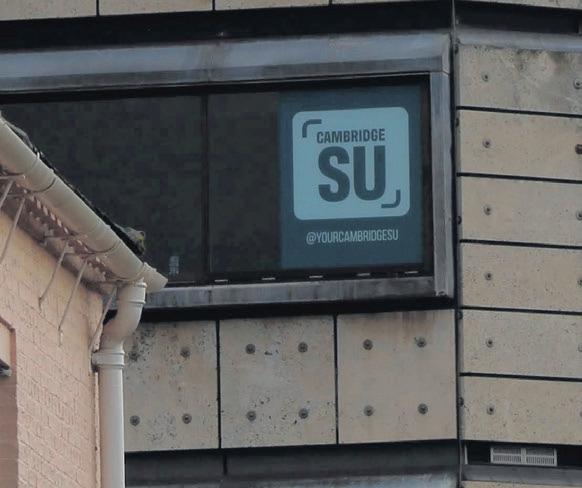
When discussing policy, there’s one thing that sticks out for both of the Presidents: student engagement. Facing up to the issue is a positive step, especially since previous teams had tried to dismiss it, but they give themselves a pretty monumental task. e most recent SU election where both Presidents won their positions had a turnout of only 10%, and Anderson is happy to accept that most students don’t “even know the di erence between the Union and the SU,” until a few terms at Cambridge. Anderson describes getting students more involved in the SU as her “passion,” grinning, as she describes that “the thing that I am actually most excited for over this year is getting out there,” and reects on how the team have been trying to introduce themselves to new freshers, meeting each cohort to provide “a proper coherent and comprehensive introduction to the SU from day one,” where they can explain what the SU does: “ is is your Sabb team and we provide free condoms, but also then this is what Council is any student can submit something to Council.” Bhattacharjee chimes in too; discussing how Sabbs




students. [...] Hopefully there are some big changes coming this year that will mean that the SU is far more accessible for the everyday student.” It’s a welcome change; Student Council, the SU’s main body for legislating, is currently so marred in bureaucracy, confusion, and ine ciency that it’s hardly a surprise that it regularly struggles to have a high enough attendance to pass motions something even the o er of free pizza hasn’t alleviated. Making the processes of the SU more accessible, and less confusing, to the “everyday student,” would de nitely go a long way towards their goal of bettering engagement. In trying to make the SU more accessible the team are also trying to be more “open and honest” about what actually goes on in the SU. Anderson comments on this approach, discussing how the team “had a very open and honest conversation about what had been happening over the last term [...] if we can be open and honest within ourselves, it should be a lot easier to be open and honest with students as well.” ere are limitations to this approach however; openness and honesty comes with an awareness of what can be shared. We can’t say everything. We can’t reveal everything. ere is stu that is condential,” Anderson acknowledges. However, at a time when the SU was recently forced to call an emergency meeting following a petition that accused it of “entrenched nancial opacity and inconsistencies,” you can’t help but feel as though more could be done in terms of openness about the working of SU beyond the sabbatical o cers. When Anderson is quizzed on their relationship with the institution, the question is partially shut down: “It’s obviously di cult to say anything, remembering our member code of conduct we can’t comment on sta ,” referring to bylaws that state students should “refrain at all times from public comment on or criticism of members of Union Sta ”. But when it is Union sta that face allegations of racism, bullying and corruption, you can’t help but feel a little more openness would be useful. On the whole, the new Presidents’ policies are a step in the right direction. ey’re ambitious and want to tackle the problems of engagement and apathy that have plagued the SU since its inception. However, I can’t help wondering if they have the tools around them to be able to achieve what they’re aiming for.
focus on “being visible” so students see the SU as “not that the poster of the logo, but the individuals they can talk to, they e team also have ambitious goals when it comes to making the SU’s inner workings more accessible too. e institution’s ongoing governance review, which aims to make the institution less dense and bureaucratic, is described as “incredibly exciting” by Anderson: “It’s a whole shake up of the way that we listen to students of how often council runs, what sort of other bodies we can have to consult the ac-










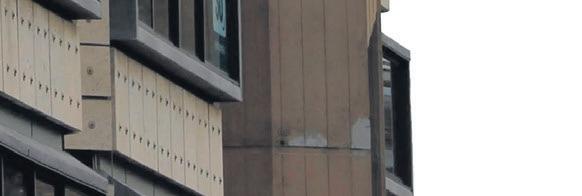
“MSCOTIA SMITH
y mum’s a sexual health nurse,” I announced to my peers with pride at 11 years old. But looking around at my school friends, who had all gathered to give a short speech on their parents’ careers, I was met with a soundless audience. From a very young age, I learnt that topics involving sexual health are usually discussed in lowered voices, hushed whispers or complete silence. However, Jara Phattey’s attitude is a complete juxtaposition to this usually uncomfortable subject matter.
Sitting down to join me at a café table, Phattey is all smiles, bright colours, and expressive hand gestures as she unabashedly explains her job working in a NHS sexual health clinic, dealing with patients with “syphilis infections, HIV, and more recently, Mpox.” She aims to end the stigma surrounding sexual health through education. “People need to understand that HIV medication is just one tablet a day. For the majority of our patients nowadays, you can be diagnosed early, and within three months, six months, you are fully suppressed.”
According to Phattey, more responsibility should lie with GP surgeries. Only sexual health clinics test people for HIV routinely, despite the amount of blood tests taken at the GP or A&E. “By
the time we see some patients at sexual health clinics,” she explains with a repressed anger, “we give them a late HIV diagnosis, and usually all of them have seen their GPs or gone to A&E before and they haven’t been o ered a test.”
e new British HIV Association guidelines involve an opt out policy for HIV testing in A&E. She tells me that now it is “incumbent on the patients to say, ‘I don’t want to be tested for this.’”
these clinics have a fragmented nature. Look at London, for example, there are di erent services for heterosexual and homosexual people. It’s not under one roof.” She continues, identifying the “Health Lottery” within British sexual health care facilities. “ e level of help you receive depends on where you live [...] we get so many patients from outside our catchment area. is doesn’t
As soon as we get the adequate funding we need, real change can be made.”





However, these new policies aren’t being introduced into GP practices, and until they are, Phattey argues that GPs simply aren’t ful lling their role and being utilised enough to combat HIV. “Until very recently, all we had in the UK was sexual health clinics or individuals going to GPs and requesting a HIV test themselves.” However, despite being the main source of HIV assessment, sexual health clinics are plagued with their own issues.






She names three major reasons for the problems these specialist centres have. “Firstly,


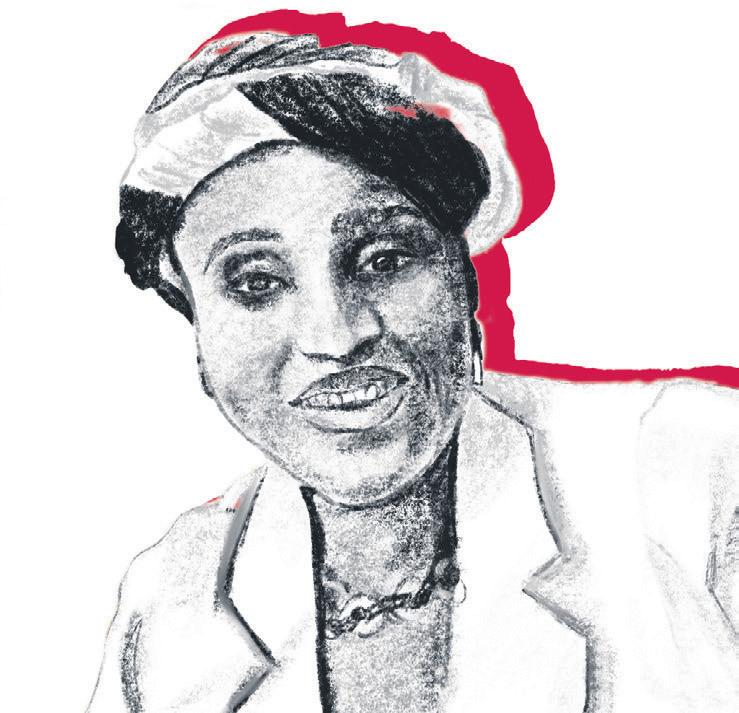
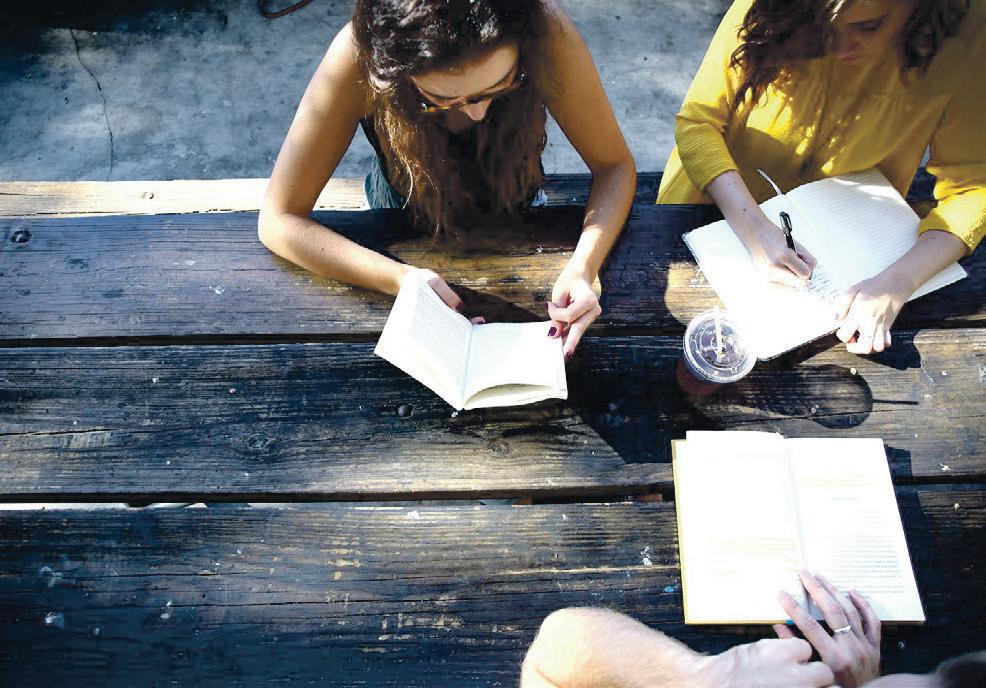



mean their services aren’t available. They are, but they aren’t as accessible as we are.” However, the point she emphasises the most is funding: “Sexual health clinics are severely underfunded and that’s the bottom line.
As well as being a major force within the NHS, Phattey is also a vocal activist within her own community to help bring awareness to HIV. She writes speeches and holds meetings for asylum seekers, people from Sierra Leone (where she was born), and other members of the African community here in Britain who have been newly diagnosed with HIV.















When asked about this work, the generalisation of ‘African community’ is not lost on Phattey. “We tend to bundle all African communities, black communities as one. My knowledge, my culture, my needs, are completely di erent from a black African who’s from Nigeria, although we’re all from West Africa. Until we really understand and tailor our health promotion materials according to people’s cultures, it doesn’t work and that’s what I’m trying to do but it needs to start being done on a much wider


















For Phattey, this is a systemic issue as well as a personal one. One of the main motivators for her activism is the knowledge that black Africans are disproportionately affected by HIV in the





◀ JESSICA LEER
UK. e reasons for this are complex, Phattey tells me. “Healthcare is free and we know that, but it might not be accessible to me as a black person. ere are a multitude of complex factors that a ect us from accessing services.” After working in the eld for such a long time, she’s identi ed that fear is a leading factor in black Africans not attending services. “ ey don’t see people who look or sound like them in powerful positions. ey’re frightened that their culture won’t be understood or respected.” As a woman who migrated to the UK herself, she understands how there could also be nancial constraints that impose on healthcare access. “Getting to GP surgeries, hospitals, clinics etc can cost a lot of money that is deemed more bene cial to be spent elsewhere.”
e Cambridge Student Union provides free sexual health supplies to students, mirroring Phattey’s desire to remove barriers to resources. “We need to have these conversations in our living rooms. We need to have these conversations in our communities.” With these parting words, I reminisce and think about my younger self. If I could go back and tell that younger version of myself to introduce her mum not just as a nurse, but as a sexual health nurse, I would. Maybe I’d have been able to start to normalise some crucial conversations.

In February 1990, Varsity published a front page with the headline: “WEALTHY CAIUS RAKES
IN CASH, College hikes up rents forcing shops to close”. e article notes that Gonville & Caius, among other colleges, was raising rents “by tens of thousands a year” forcing many independent stores to close down. Caius’ bursar at the time admitted that “the best bidders for leases tend to be souvenir shops rather than old businesses,” to which one business owner replied: “We will become a city of galleries and trinket sellers as a result. Old Cambridge has de nitely gone for good.”
❝ Wilfreds, the iconic sweet shop on King’s Parade, closed down at the start of September after ten years on the street
Fast-forward 30 years, (with many new galleries and trinket shops later) and another of Caius’ independent tenants has shut up shop for the last time. Wilfreds, the iconic sweet shop on King’s Parade, closed down at the start of September after ten years on the street. e traditional sweet shop with its dark green and gold exterior
akin to shop fronts on Diagon Alley — sold hundreds of di erent types of sweets including pear drops, humbugs, ying saucers, Murray mints and cherry pips. e shop was popular with locals and tourists alike, eager to indulge in traditional treats in a quintessentially historic city.
The news of the store’s closing upset many, but perhaps no more than the shop’s owner, Nigel Fisher.
Fisher has been in retail all his life and used to own a chain of 250 fashion stores. For him, the sweet shop was a retirement project and he loved it: “When I took the shop ten years ago I knew I was overpaying, but I wanted the shop,” he said. To open a store in central Cambridge was a dream come true for him: “I always said my shop on King’s Parade, bang opposite King’s, had probably the nest retail view in the country. It was just superb.”
Owning the sweet shop wasn’t all
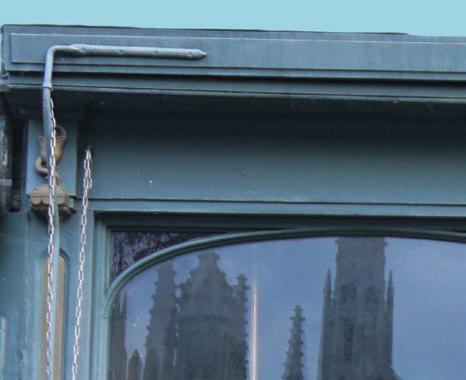
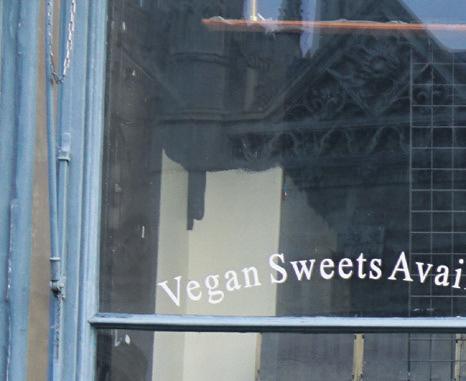
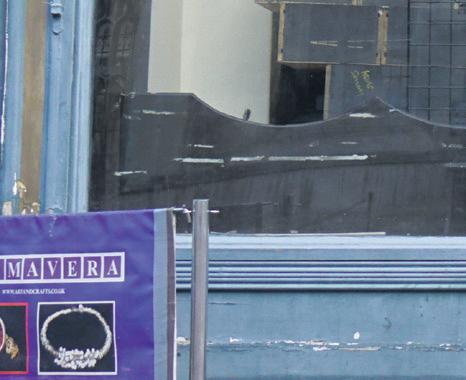
about the money for Fisher, it was a chance for him to run something he was proud of and could enjoy. “It was fun,” Fisher recalled, “we always used to have e Beatles music playing and all the locals used to come in, and all the tourists.”
e store was named after his grandson Wilfred who was born with Crouzon syndrome, a rare genetic disorder which causes the skull plates to fuse abnormally. e shop, which raised money for Great Ormond Street Hospital where Wilfred was being treated, brought Fisher’s grandson immense joy: “He used to walk around Great Ormond Street Hospital with a sticker saying ‘Wilfreds’, saying that’s his sweetshop named after him, and it was very, very sentimental.”
Despite its popularity, Wilfreds had to shut its doors after their lease expired with Gonville & Caius College, their landlord. Fisher was very keen to continue trading on King’s Parade, and even told me that he o ered to pay above market rates to keep his store. But Fisher said his lawyer forgot to extend Wilfreds’ legal coverage period during negotiations, giving Caius the right to refuse a renewal of the lease. When Fisher discovered that Caius wasn’t interested in renewing, he was shocked; negotiations at the time appeared to be going smoothly and Fisher had never owed any rent in the ten years he’d been there. When he enquired into

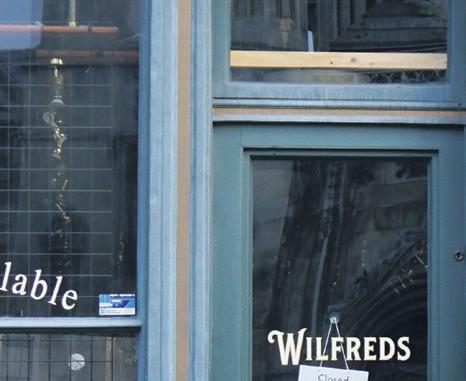
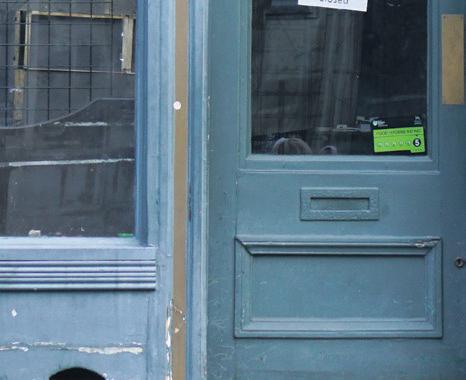
why, Fisher was given little explanation beyond the fact it was for “reasons associated with the strategic management of [Caius’] portfolio of properties,” as explained by the outgoing bursar. Fisher sent impassioned pleas to both the bursar and the Master of the College to reopen negotiations and said he “almost begged them to reconsider” but his attempts were unsuccessful.
Wilfreds is the only store on King’s Parade where Caius is the landlord, but the College owns a signi cant number of retail units across central Cambridge, including all those on Rose Crescent, as well as many on Trinity Street and Green Street. The closure of Wilfreds has left Fisher and his family dejected and upset: suddenly losing the best retail view in the country and a place that housed so many happy memories is a tough pill to swallow. Wilfreds still operates online and has a store in Stratford-upon-Avon, but the Cambridge

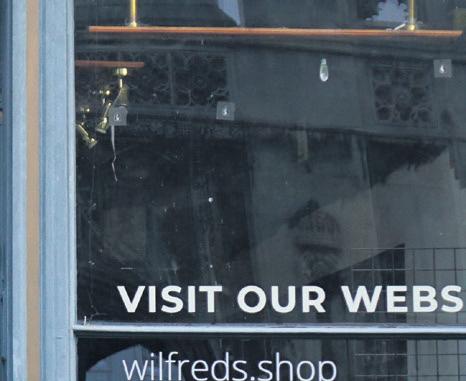
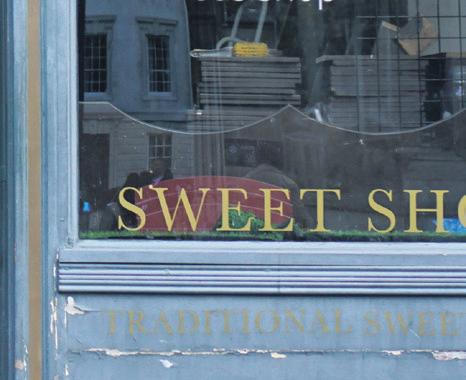
Fisher sent
shop was a large part of their business. e loss of another independent business in the city-centre continues Cambridge’s trend of losing its unique retail identity to a bland medley of fast-food chains and Harry Potter souvenir stores. One Cambridge alumnus who studied here in the 90s told me about the joy he used to have shopping at independent stores on King’s Parade and Fitzwilliam Street, many of which have now closed. Even the fast-food in Cambridge during the 90s seemed to match the traditional, academic aesthetic with McDonald’s having large pillars inside it that gave it an “ancient Rome theme”.
impassioned pleas to both the bursar and the master of the college to reopen negotiations
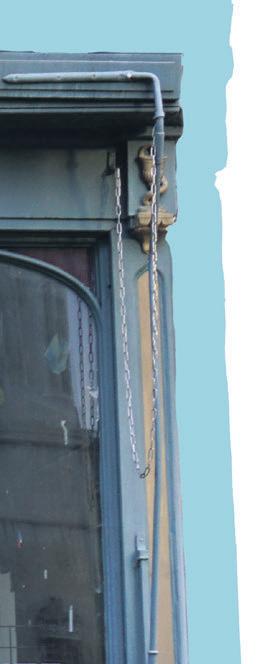
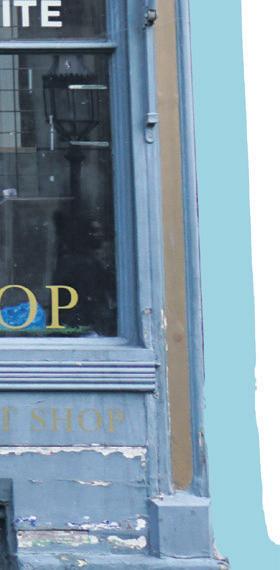
Today, a signi cantly more modern McDonald’s is rivalled by KFC, Taco Bell, Subway, Popeyes and Wendy’s, all within a ten minute walk of each other. And that’s nothing when compared to the number of popular co ee chains that operate within the city; Café Nero has three stores in central Cambridge alone. is trend isn’t unique to Cambridge: an estimated 7,800 independent stores closed down across the UK in 2023 and business insolvencies rose by more than 52% from 2021 to 2023. ere are many factors behind this, including higher interest rates and slowing consumer spending, but relations between landlords and retail tenants have always been notoriously fraught; landlords often try to maximise the economic value of their properties while tenants want to keep their costs low.
Fortunately, Cambridge is still populated by a large number of independent stores that breathe life into the city. Despite the large number of American fastfood restaurants, students can still go to Cambridge’s Gardies (although even this store was nearly closed down, but was saved by signi cant student backlash), and for all the chain co ee shops, there are still plenty of local cafés.
It is these local stores that help mark our time at Cambridge as unique and memorable. You likely won’t remember the trips to Sainsbury’s or Costa when you re ect back on your university days in 30 years time, but you will remember those quirky independent businesses with smiling sta and intriguing interior decoration. e people that run these stores give back to the Cambridge community and help sustain an image of the city that entices millions from across the globe to visit. Independent stores also play a vital role in the local community, giving people “a way of being in touch with what’s going on with the people around them and a way of communicating,” as Fisher notes.
While Wilfreds’ time on King’s Parade has come to a bitter end, with enough support there is still hope for other local businesses to see sweet success.
A spokesperson for Gonville & Caius College told Varsity: “Mr Fisher, the tenant trading as Wilfreds, had a statutory right to a new lease but did not exercise it. We hope Wilfreds nds alternative premises.”
If the area of the outside square is 100cm², what is the area of the inside square?
What percentage of respondents successfully solved this?
‘We are all about opening doors’: the secret lives of Cambridge’s librarians
As Michaelmas arrives and everyone from the freshers to the Vice-Chancellor limbers up for a new academic year, few are busier than the librarians of the university. Updating reading lists, hiring new staf, planning library inductions — they would have been forgiven for not having time for a Varsity journalist asking irritating questions about their jobs. But librarians at the college, faculty and university level were kind enough to talk to me when I pitched an article about the secret lives of Cambridge librarians and the myriad and often unseen ways that they make so much of what happens at this university possible.
❝heir job is made unique by the unusual variety of material they ind themselves working with
As elsewhere, librarians at Cambridge have the task of managing and organising their large collections in a way that is helpful to students and researchers — a task often complicated by the great age of the institutions in question. Aishah Olubaji and Lauran Richards of Magdalene College library tell me that parts of Magdalene’s inhouse classiication system were designed centuries ago based on the subjects that were studied by students at the time. It’s no surprise then that the project most preoccupying them at the moment is a reclassiication of the collection to address past oversights and improve browsability.
Responding to your questions is what we are here to do
Other librarians remark on how their job is made unique by the unusual variety of material they ind themselves working with. Emily Dourish of the University Library (UL) gives as examples of her work over just the last few days: “Investigating 19th century Chichewa hymn books,” helping to “organise MPhil seminars on Montaigne” and “discussing 17th century editions of Aphra Behn with a student in the Rare Books Room”.
I ask about the typical routes into becoming a librarian, but it seems there is no standard career path. Olubaji irst worked as Early Career Librarian at an

Oxford College while studying for a Library Master’s degree, while Jo Harcus of the philosophy library began by managing a collection of books and other teaching resources at a local council admin job. One commonality that Dourish highlights is, of course, a love of books: “A lot of people know it could be for them from quite a young age when they fall in love with their school library or local library.”
Equally, Harcus points out that “we work in libraries because we love books […] but we love helping people more.”
And when I ask what they wish more students knew about college librarians, all emphasised that they are here to help.
“Many students start interactions with us at the help desk by saying ‘Sorry to bother you’,” say Olubaji and Richards, but “responding to your questions is what we are here to do, and you are not bothering us.” hey also wish that more students knew about the variety of services that libraries can ofer, which include not just support with study skills and signposting to useful material but also wellbeing support. Increasingly libraries are developing ‘support to address student mental health and accessibility needs’, for example, self-help reading materials or standing desk adaptors and writing slopes for use in the library.
As the Deputy Keeper of Rare Books at the UL (what a job title!) Dourish is especially keen to emphasise what is on ofer for students with regards to the UL’s special collections. “he most challeng-
ing thing is helping people overcome the feeling that these books aren’t for them.” he rare books and early manuscripts are not the exclusive preserve of those with postnominals: “he team here wants to share it all with you!”
We work in libraries because we love books […] but we love helping people more
According to Harcus, one of the challenges involved in being a librarian is the situations where they can’t help “for reasons beyond our control, such as copyright restrictions.” his is merely an opportunity to get creative, however: “With the help of the library hive mind, we can usually ofer an alternative solution.”
Big, poorly-lit buildings with imposing architecture and strange names –Cambridge libraries can be intimidating places. But returning students and freshers alike can take comfort in the fact that the librarians who work there are eager and ready to make these scholarly spaces open and accessible to all. As Dourish puts it, “we are all about opening doors, not acting as gatekeepers.”
Varsity quickire: get to know the college librarians!
Q: Favourite book?
A: heory of the Subject by Alain Badiou. Maybe I'll even understand it one day. (Neil)
A: The Hitchhiker's Guide to the Galaxy by Douglas Adams. (Sara)
Q: Any funny stories as a librarian?
A: I was working in another library and a car company wanted to ilm their car in the library. We had to email back and say “how do you intend to get itthrough the door?”. he ilming did not go ahead. (Hannah)
Q: Favourite part about your job?
A: Giving people access to resources that will enable them to achieve their life goals. (Sara)
Q: Favourite moment?
A: Anytime a reader thanks me for inding a book for their studies or exams, it never ceases to make me feel good. (Sara)
Q: Favourite book?
A: Second Place by Rachel Cusk. Cusk is a very talented writer.
Q: Any funny stories as a librarian?
A: When I worked as a school librarian we played an April’s Fool joke on the kids by closing the library and saying that there had been an infestation of bookworms! Of course the infestation miraculously cleared at 12:00 noon.
Q: Favourite part about your job?
A: he Robinson students … they are the best. Trying to create an atmosphere where everyone thrives. Being at an amazing place of learning.
Q: Favourite moment?
A: he moment when I heard I had won the CUSU Student Led Teaching Award for Academic Support in 2020. hat meant a lot.
While not actually a u, freshers’ u can still spread (and feel!) like the plague. Characterised by headaches, fevers, coughs, and a blocked or runny nose, this bad cold is the dampener of many a student’s rst experiences of university and (talking from experience) can turn Freshers’ Week into a hallucination- lled hell, even without entering Revs. So, can we do anything to avoid this?
First of all, it’s important to consider the scienti c basis of the cold. Caused by a virus, once infected the body requires the immune system to rst detect, and then act to neutralise the foreign pathogen in order to combat the illness. Considering this, one of the best ways to lessen the impact of freshers’ u is to enact preventative measures, ensuring that our immune systems are healthy and in a t state to ght o the virus e ciently.
forms which come in di erent avours, with the tropical avour from Sainsbury’scolouringmy rstyearLentterm.

Some honourable mentions here are vitamins A, D, B3 and the essential mineral zinc, which also contribute to immune support and good general health.
e immune system, like our digestive and circulatory systems, requires maintenance. A sure- re way of doing this is by being mindful of the fuel we give our bodies.
Perhaps at the top of the list for promoting immune health is vitamin C, whose bene cial role doesn’t end there: enhancing iron absorption (which bene ts your red blood cells), speeding up wound healing and strengthening blood vessels, there really is no reason to not seek this vitamin out. Vitamin C is found concentrations in citrus fruits, as well as broccoli, tomatoes and cantaloupe, and is also widely available in dissolvable tablet
Changing environments and meeting new people at university can be a stressful time; a main reason for the in ux of illness at the start of the new academic year. Nicknamed ‘the stress hormone,’ cortisol at healthy levels is actually bene cial. Originally an integral part of the ght-or- ight response, the hormone helps to maintain blood glucose levels by stimulating gluconeogenesis the process of creating glucose in the body as an alternative to breaking down glycogen stores to release it. is action has helpful ramications for the body by providing an additional fuel source, which is why cortisol levels increase in stressful situations, starvation, and during a period of sleep.
tually impossible to avoid stressful moments at university, especially during Freshers’, but making sure to have moments of comfort during those times is important. is could include maintaining strong support networks, such as with family and home friends, spending time with yourself and your hobbies, and later keeping up open communication with supervisors and student support services if you need them. A hot cup of tea can go a long way too.
❝
Nothing better than sharing hand sanitiser for making new friends
and routine
sleeping well, taking measures to minimise transmission can also decrease your chances of catching freshers’ u. is can include improving air quality during meets by opening windows or meeting outside, keeping up with recommended vaccines (just in case the shivers you catch turn out to be meningitis, a di erent breed of evil) and increased hygiene, which may include washing hands regularly (with soap, you ends) and keeping hand sanitiser handy: an added bene t to this tip is the increased chances you get for interaction nothing better than sharing hand sanitiser for making new friends.
Finally, it’s probably healthy to resign yourself to the fact that, like everyone else, you will probably end up with freshers’ u at some point anyways, despite the measures you take to avoid it. At this point it’s an (albeit snotty) rite of passage. Recovery looks di erent for everyone; don’t be discouraged if your body
takes longer than most to shake it o . Eating healthily and drinking plenty of uids can help (no, vodka lemonade doesn’t count), as well as taking paracetamol, soothers or strepsils to alleviate symptoms. Hot drinks, such as the tried-and-tested parental remedy of chopped ginger and lemon in hot water, can clear passages and be useful destressors.
When you talk to older years about combating freshers’ u, you are often met with a laugh and a comment about how you can’t. Sometimes rare tidbits of sage advice are given, such as carrying excess tissues around (‘you can never have too many tissues’) and stocking up on Lemsip preemptively (‘don’t rely on Mainsbury’s to save you’). While it may not be possible to completely eradicate the additional cortisol that comes with the Cambridge experience, you can at least open the multivitamins bottle that your parents stu ed into your backpack before you left home.

is used





Cortisol’s role in immune suppression involves inhibiting the secretion of interleukin by immune cells. Interleukin a type of cytokine (messengers used by the immune system) to mediate cellular immune responses. At healthy levels, cortisol is used to keep the immune system in check: preventing negative autoimmune responses and nullifying immune system hyperactivity.
When cortisol surpasses healthy levels (which also includes raised cortisol levels over long periods of time, seen in chronic stress), is when things start to go awry. Consistently raised cortisol levels lead to continuous immune suppression, resulting in a decreased immune response when it is most needed during an infection or
illness. is can mean that fresher’s u can wreak havoc in the body for much longer, increasing the time spent with the sni es



is cycle of cortisol concentration is linked to circadian rhythms (your internal body clock). During a typical night’s sleep (which, if going by expert recommendations, should be 7-9 hours a night), cortisol levels are low and proin ammatory hormone levels are high, a pattern timed to the resting period. ese pro-in ammatory hormones have immuneboosting functions such as increasing cytokine production, helping ght infection. In the morning, cortisol levels increase in response to a drop in blood glucose levels due to not eating while asleep these higher levels then help to control the immune system and return immune cell numbers to a lower base-

How can we manage stress? is is the million-dollar quesit’s vir-

With all this in mind, it isn’t hard to see how both sleep deprivation and irregular sleeping patterns can hinder the immune system on its quest to rid us of illness. As the culprit that’s also behind jetlag, unsynced cortisol cycles can additionally lead to memory problems, anxiety, changes in metabolism and headaches. Having regular sleep patterns can minimise mood changes from cortisol uxes during waking hours, and working routine into your day can also relieve stress: a double
whammy of cortisol-reducing tech-




ience, ultivitamins arents


In addition to getting your vitamins, managing stress and

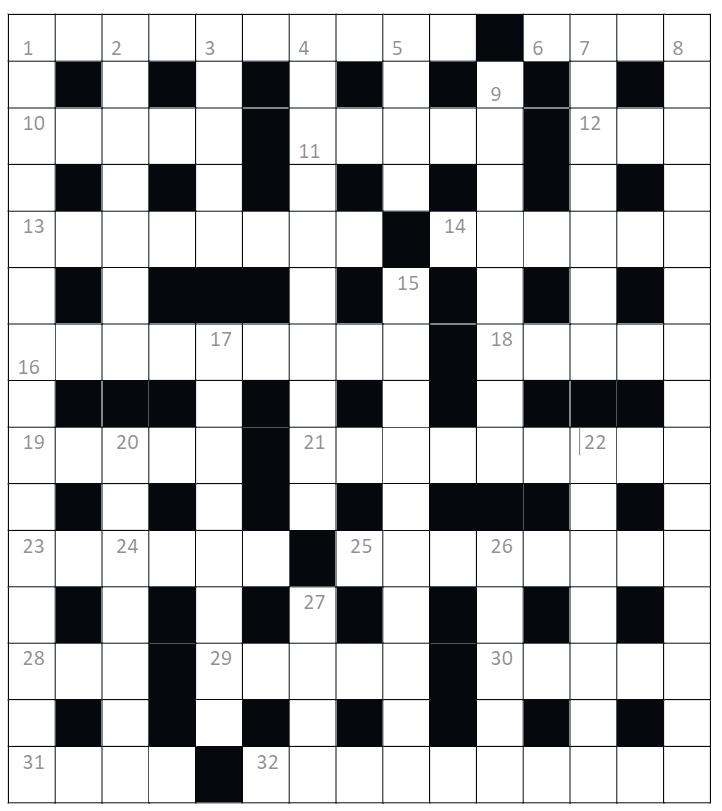
ACROSS
1 e oldest College in Cambridge (10)
6 Country with capital city Suva (4)
10 Basketball legend Shaquille _____ (5)
11 Pembroke College is the _____ oldest Cambridge College (5)
12 Alas (3)
13 Son’s son (8)
14 High in rank or status (6)
16 “Heart of Gold” and “Heart of Stone” for example (9)
18 Frequency of Light: _____red (5)
19 New (5)
21 Cocktail containing apple juice, apple schnapps and vodka (9)
23 Myth (6)
25 e youngest college in Cambridge (8)
28 Meshed fabric for shing (3)
29 e second oldest college in Cambridge (5)
30 Like the magistrate of Venice (5)
31 With 29, the second youngest college
ACROSS
1 Understand how one might begin to ride a bike? (3,2,5)
6 Good grades seperated by concerning stretch (4)
10 “STEM endeavour” is cover-up for revision (5)
11 Cheap ooring in New York, on 6 and 50 (5)
12 Bird noise sounds like revolt (3)
13 What Romans might have read “I mix” as? (8)
14 Use Frat ID to get o course (6)
16 Heavenly entity staying at hotel is surprise appearance! (5,4)
18 Jazzy duo to outperform (5)
19 Rugby play where ball-carrier loses half of boot (5)
21 Earliest forms of stormy sailoring (9)
23 Idea of country losing bomb for nothing (6)
25 Join intersection (8)
28 at girl’s champion not getting old (3)
29 Greek character nishes mountain with laughter (5)
30 University mass supporter’s shadow (5)





Resident Archivist Vialli McComb investigates the spirited student responses to Cambridge’s controversial speakers
Given Cambridge’s colourful connections and global prominence, we regularly play host to a variety of academic, political, and celebrity speakers. However, these talks are seldom without controversy, and protests and counter-protests frequently ll the air with noisy chants; I can vividly remember hearing the incredibly loud drums protesting against Israeli Ambassador Tzipi Hotovely’s talk at the Cambridge Union from my room in nearby Jesus College.
in Cambridge (4)
32 In a cocky manner (10) DOWN
1 Cold meal involving bread, cheese and pickled onions (10,5)
2 “___ is a foreign country: they do things di erently there” – L.P. Hartley (3,4)
3 Led (5)
4 At right angles to each other (10)
5 Spoke (4)
7 “To summarise” (2,5)
8 Worldwide (15)
9 Epoxy or Glue for example (8)
15 “I guess” (1,7,2)
17 Type of jumper (Anagram of OPEN LOCK) (4,4)
20 Like a plant (7)
22 Accurate and deep understanding (7)
26 I in the phonetic alphabet (5)
27 Surname of e Incredibles, or one of Henry VIII’s wives (4)
31 Mince and potato dish (4)
32 What my DoS says I should do without an accent?
DOWN
1 Book in eco-friendly encouragements including radio, say (5,4,3,3)
2 Old baths are heat-wise, nearly ecstasy (7)
3 Opening receptacle, disregarding every rule (5)
4 e French, for example, erupt into Louvre (10)
5 Agony, so it’s said: you can see through it (4)
7 Proof of purchase from resort, pier etc. (7)
8 Very long time, like a religious December? (1,5,2,7)
9 Happy with last portion of garlic mayonnaise and owers (8)
15 Say actual rite weirdly (10)
17 Heat of the mouth is time-related (8)
20 Gives back pro ts (7)
22 Friendly “Can I?” (7)
26 Hammers in 4, 11, 25, and 31 for a Cambridge resident? (5)
27 Small hole for saliva (4)
Find all the battleships in the grid. ere is one battleship (4×1 squares), two cruisers (3×1), three destroyers (2×1), and four submarines (1 square each). e ships do not touch, not even diagonally, and the numbers indicate how many squares in each row and column are occupied by ship parts.












ere can be signi cant obstacles when hosting such polemical personalities, and these challenges were highlighted last week when Cambridge University’s Conservative Association (CUCA) was forced to cancel an event with former Home Secretary Suella Braveman last week on the basis of unprecedented security and logistical concerns arising from a planned protest. In this edition of Vintage Varsity, I have uncovered a handful of occasions when these concerns turned into reality and protests became physical.
In 1982, Varsity reported that CUCA welcomed Sir Geo rey Howe in the Cambridge Union and, during his defence of the Government’s long-term economic strategy, a Catz student protester provided “an embarrassing reminder of political gure’s vulnerability when [coming] to Cambridge” by launching a combination of our and eggs at the then Chancellor of the Exchequer.
Although only su ering “a light covering” of our to his green tweed jacket (most of the our landed on then CUCA President Simon Barnes), Varsity noted that Sir Geo rey joked about regretting his comment from earlier in the evening that it was “nice to come away from the House of Commons to somewhere civilised like this meeting [of CUCA members]”.
is event was one of several foodrelated security breaches: Labour’s Foreign Secretary Dr David Owen su ered the same oury-fate in 1978, and the Chairman of British Steel Sir Charles Villiers was “pelted with tomatoes” in 1980.
Straying away from cooking ingredients, in 2009 student protestors took their inspiration from the famous – or perhaps infamous – incident in Baghdad where an Iraqi journalist threw his shoe at President George W. Bush. One student lobbed his shoe when the University hosted Chinese Premier Wen Jiabao at West Concert Hall in February, and another followed suit in November at the Cambridge Union when former Australian Prime Minister John Howard visited. Luckily for the former PM, “an avid cricketer” in the audience leapt up to intercept the ying boot. Unlike the startled Sir Geo rey, Howard took light of the situation by laughing at the “pathetic throw” and stating that the boot-thrower “would never be on my [cricket] team”.
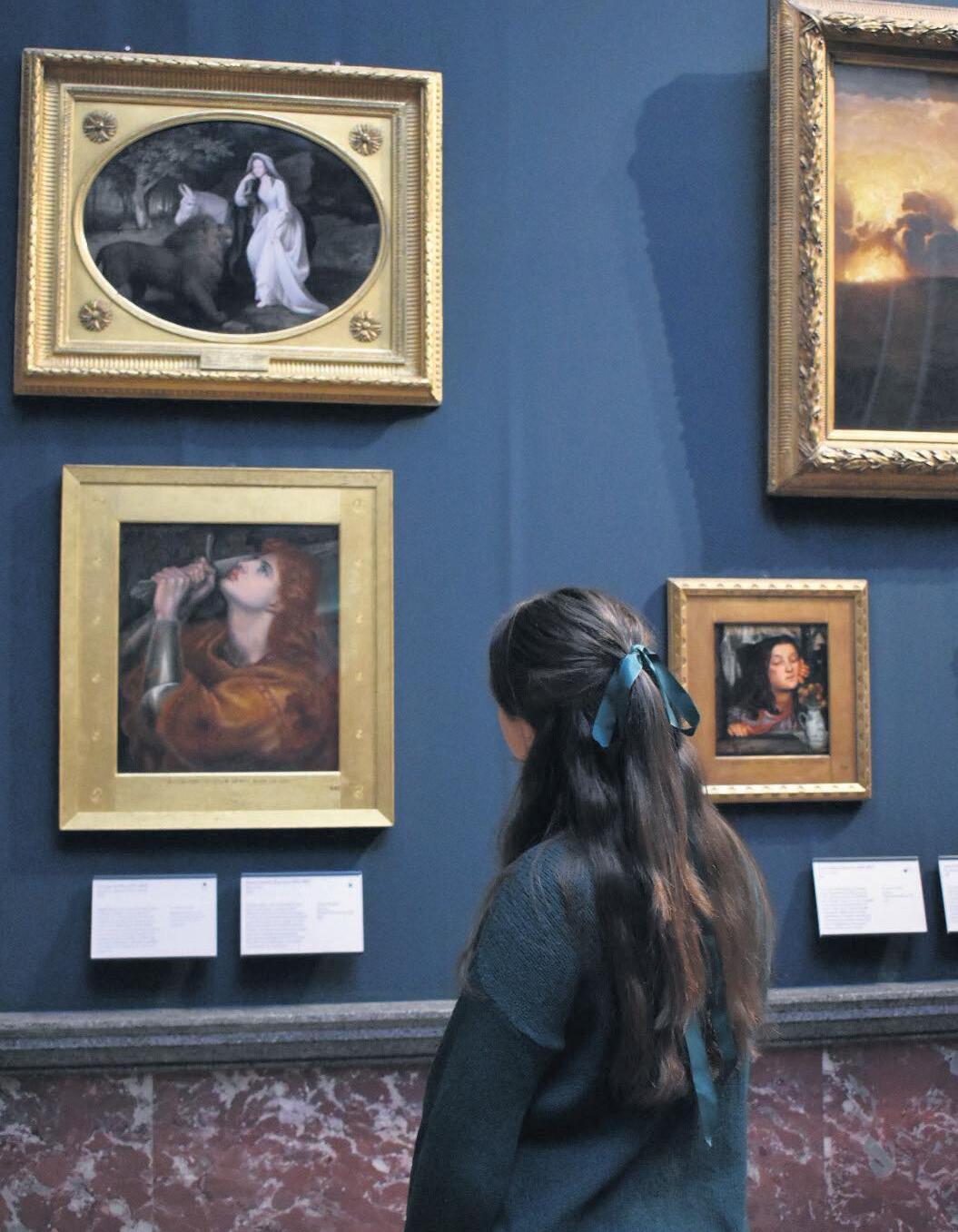
A) Revs-ing all your problems away
B) In the college library, on the work grind
C) In a very deep, undisturbed slumber
D) Spending time with friends in the college bar O n a Wednesdaynight, youcanbefound . . . A) Brainrot!
B) Attempting to read something


Yourfavourite sweettreati



C) Staring into space
D) Scrolling through Netflix (and never deciding what to watch) Yourgo-to pastimeis…
If you picked mostly A: TikTok Ah, the classic TikTok. I’m still not entirely sure what it was about the 15-second dance clips, composed of oppy hand gestures, that was enough to become a global sensation, but the human condition is a strange one. You’ve probably convinced yourself that brainrot breaks are healthy for productivity. ey’re not. You’re good at spotting the latest trends and are up to date with the internet lingo. You stick to the classics!




A) Anything that involves chocolate
s …
B) Pastries
C) You don't eat sugar.
D) Jack's
If you picked mostly B: LinkedIn ere is one thing I know for sure and that is you’re going into the soggy, grey, corporate world, aren’t you? And you’re probably excited about it. I will admit, LinkedIn can be fun: there is something about nding out the credentials of all the people you barely know that can be somewhat satisfying. I think it’s time that you touch some grass, and if this means momentarily stepping outside college, by all means please do so: you probably need to.
A) Your phone to keep you company



B) A boat to escape the island with

C) Just yourself. You're a thought daughter.
D) A fishing rod What
If you picked mostly C: Shorts I don’t really know what possesses one to use YouTube Shorts; the only explanation that I can come up with is that you’ve banned yourself from both TikTok and Instagram in the noble aim to reach new ascetic heights. But it hasn’t been very noble has it? Because now you’re just addicted to Shorts instead. While I don’t think Shorts will ever be cool, if you are optionally enduring this kind of content, I have a strange form of respect for you.
sland A) Y2K
B) Office siren
C) Very plain



D) Frazzled English woman Youwould describeyourstyl e as . . .



If you picked mostly D: Reels e reason why you should stick to the classics is to avoid being addicted to recycled, second-rate content ... like Reels. Be honest with yourself: you probably swore that you’d never downloadTikTok and now you’re addicted to Reels instead (sadly, I relate). Your friends probably make fun of you when you seize upon Instagram as your go-to brainrot content but you can’t go back on your word (once again, I relate). Stick to your guns, I believe in you.
In her debut as Varsity's Agony Aunt, Jessica Spearman helps resolve your Michaelmas mishaps
Whether it’s your rst Michaelmas in Cambridge or your last, we all have problems. A long summer, a new environment, and too many people to avoid, all make Michaelmas a chaotic time. e good thing for you is that, even though I can’t solve my own issues (of which there are many), I’m here to help you solve yours!
I’ve come to uni and I can’t cook, help!
Well, someone didn’t spend the summer becoming the next Gordon Ramsey. Fear not! In failing to give you an adequate kitchen, Cambridge has solved this problem for you. Even the bravest and most adventurous chefs among us could not dish up a Michelin star meal in a gyp (or even an oven pizza from the Mainsbury’s frozen aisle). Instead, consider a diet of cheese on toast, pesto pasta and meal deals (Clubcard savings optional, but recommended). If you’re ever struggling with culinary creativity as a result of facility impracticalities, there are a ton of Varsity Lifestyle articles to help you on your way. Alternatively, move to a college that has better kitchens; I’ve heard Medwards is great.
Do I get back with my Easter situationship?
Just because Oasis has reunited doesn’t mean you and your ex should. If anything, the word ‘ex’ is doing too much; this was probably a man you met in the Pick once or twice and who didn’t message you once all summer, despite captioning your hottest sel es with targeted songs on your Instagram story. If they didn’t swipe up, you already
have your answer. ere’s a reason why you didn’t spend the vacation together and haven’t met up since. Don’t despair, there are a lot of hot singles in Cambridge, and you’re one of them! Instead of settling for mediocrity, go put yourself out there. Let it go, babe. I’m sure they did a looooooooooong time ago.

My friends-with-bene ts goes to Girton and I’m at Homerton — how do we make it work?
Firstly, how wide are the geographical boundaries on your Hinge? You were warned not to commit collegecest and you went ten steps further in picking someone who, quite literally, could not be further away. I applaud the commitment and I hope the sex is excellent! e U-bus is about to become your best friend. In fact, they should o er you a discount because you are about to fund about ten more buses (which will hopefully come on time). is will require some planning based on bus timetables, though how reliable these are anyway is up for debate. ere’s no point walking; by the time you get to theirs, you’re sweaty, starving and tired. e other alternative is an Uber but who has that kind of money? Please note that nothing about this will be
sneaky; there’s only one reason why your Bitmoji will be that far away and it won’t take a genius to work it out. Not to mention the amount of people you’ll see on the way, too.





Will my longdistance relationship work even though I’m at Cambridge?
No. But why would you want it to? University is a new experience. You’ll be trying new things, discovering who you are, and meeting new people. is doesn’t mean you have to go wild at Sunday Lola’s (they can never make me say Kiki’s), but if you want to do that too, go for it! If you feel like being in

a long-distance relationship is making you miss out on the Cambridge experience, I’d just end it now. Cambridge is three short years of stress, love, and novelty, don’t waste a second on some teenage relationship. e reality is almost everyone I know who came to uni in a relationship ended it with them eventually, and we’ve all shared our regret for staying in it so long. I’m protecting you from my mistakes. Just give up now before it gets harder.
I signed up for too much at the Freshers’ Fair, what do I do now?
Ah, rookie fresher mistake. Both your eagerness to try new things and your inability to say no to people have ended in you joining the mailing lists of about 70 di erent societies you aren’t even interested in. You just wanted a tote bag, a mug, or a mini bag of Haribos, and now your inbox is so clogged that you can’t nd the email about your supervision times. Well, too bad, you have to go to every event in every society and can't drop out at any moment. Kidding, obviously.
But you should de nitely try as many new things as you are interested in. It’s a great way to meet new people, try a new hobby, or just forget about being homesick. You don’t have to commit to every single event ever run, you’ll never have enough time for that, just go to the ones that appeal most to you. at’s the great thing about university life; it’s the rst time you’ll be living independently and that means you get to decide how you spend your time! ere are ways of mass unsubscribing from mailing lists, too. But if you’re struggling to nd a society to pick, join Varsity. You won’t regret it.

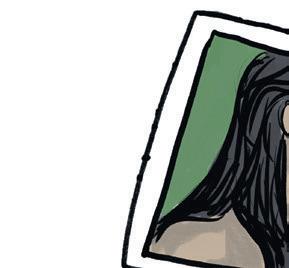








ake it from a former nerdy East London lesbian with no time for pretension: Cambridge changes you. I left Hackney in September with a double hoop nose ring, a poster emblazoned with the words ‘Never Kiss a Tory’, and black high-heeled boots for towering over men in clubs, yet returned weary-eyed after Michaelmas with friends who skied, a posh grammar school boyfriend in tow, and ready for a few searching questions from my parents. So, what happened?


dodgy tattoos, to the girl with a boyfriend she met in Freshers. I soon found that expressing my bisexuality whilst dating a man was something new and weird, and coming home at Christmas was met with wideeyed friends asking: “Wait, you’re dating a boy?”










Well, what happened was a triple threat major identity shift. I arrived at Cambridge thinking my middle class weakness for smashed avocado on toast (and the £16 bill) would single me out as the posh girl from London, but quickly realised Cambridge operated in a league of its own. only that, but both of my two new best friends skied, and one had a horse. If someone didn’t go to private school then grammar was the norm. Suddenly I didn’t feel quite ‘posh’ enough. Mind fuck number one.





Next, within a year, I had gone from a commitmentaverse lover of girls, with bright red hair and a few


I’d gone from being the slightly nerdy girl in the friend group, who would balance her Oxbridge application with three nights out a week (while my friends partied most nights, delaying UCAS another year), to entering an institution where a couple of piercings and being a regular at a few Dalston nightclubs suddenly set you apart from from the rest. I mean, I could even be considered ‘cool’ now (though the bar is admittedly pretty low).












vre around your new environment. You will meet people who are completely di erent to you, and realise that perhaps your vili cation of skiing was a little misplaced (just me?). Change will happen, as Cambridge is an experience not quite like any other, for better or worse.










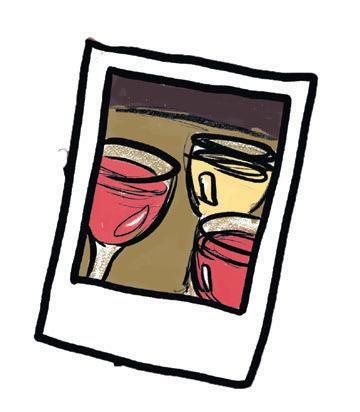

So, how do you maintain your former identity whilst attending an institution which consistently challenges it? Well the simple answer is, you can’t. Whilst it might have taken a couple of wine-fuelled debriefs with the girls to accept it, the unique vacuum that is Cambridge will change you, or at least how you perceive yourself. Ideas of class, sexuality, and, in fact, most ties to your identity will shift and manoeu-













And, even if you can’t keep your entrenched identity from before, there are ways to deal with the changes. Firstly, don’t ght it so hard. You don’t have to be who you were, with the same hobbies, interests, or friends. Realising that — with my three hours of studying per day compared to other people’s eight plus hours — I would not be viewed as particularly hard-working, took a massive burden o my shoulders. Going from being an anxious, overachiever to being just plain anxious felt kind of nice. I may have been a bit of a geek in London, but certainly not here.
new things (is it inappropriate to say I’m trying out men?), and allow yourself to grow and change. What I’m trying to say is, Cambridge will alter your self-perception and your old identity, but that’s ne. I’m not saying everyone will nd a new sexuality, and don’t worry, you probably won’t nd yourself only dating posh boys from Kent, but if it does end up that way, just go with it. Who knows who I’ll be by the end of second year? But right now, I’m the former East London lesbian telling you to allow yourself to change. You might even like it. And who knows? Maybe if





brow pierc-

you the boy thing doesn’t work out, the eyeing might even make a







You can also let a few things go (goodbye running!) in order to deal with the massive identity changes (what, I’m bi now?). You might fall out of love with old hobbies that seemed to de ne you after seeing how madly competitive it is here at Cambridge (never met a ‘social rower’ in my life). Similarly, you can pick up new hobbies (watch out pole dancing, I’m coming for you in second year), try








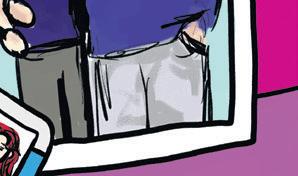







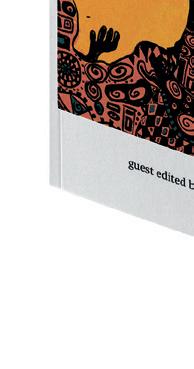

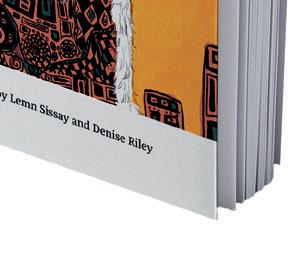




JBEN BIRCH
im Ede is famous for his extraordinarily good taste. e life of the man who curated and lived in Kettle’s Yard is a far from simple one. Harold Stanley Ede was born in 1895 in Penarth, just a few miles from Cardi . It’s strange to think that he was born in the nineteenth century — in a place as old and storied as Cambridge, Kettle’s Yard has always felt incredibly modern. e child of middle-class Methodists, his mother was a teacher and his father a solicitor. Ede received an expensive education across the UK and went on to Edinburgh College of Art before the First World War arrived. He was commissioned as an o cer in September 1914.
It’s a rather overworn truism to say that the First World War de ned the art of the twentieth century. It might be fairer to say that the war left behind a generation of juvenilia, early works, and fragments — more artists’ lives were ended by the war than any number of survivors whose lives were de ned by it. Nonetheless, it’s important to understand Kettle’s Yard in the context of Ede’s military service. He su ered from what’s called combat stress reaction, or ‘battle neurosis’. is manifests itself in restlessness and irritability which grows to panic and rage. Kettle’s Yard, with its white-washed walls and homely exactness, is a reaction to this — Ede’s
habit of arranging pebbles in a spiral is as much neurotic as it is meditative.
After the war, he went to work at the Tate, or the National Gallery of British Art as it was known then. Jim’s contemporary tastes and unconventional approach placed him at loggerheads with his bosses immediately. e museum had refused to buy Picasso and had little interest in Ede’s acquisition of some of Van Gogh’s work. When proposing that the gallery buy the works of French sculptor Henri Gaudier-Brzeska, the higher ups at the Tate suggested that Ede should go and supervise the ongoing window-cleaning of the museum instead. Gaudier-Brzeska was one of those artists whose life was brutally curtailed by the war. He was killed in the trenches of northern France at only 23 years old. Ede wrote a biography of the artist called Savage Messiah which was later turned into a lm by Ken Russell. Despite everything, Gaudier-Brzeska’s enduring legacy is a direct result of Ede’s pioneering and belief in his own good taste. Gaudier-Brzeska’s works are still dotted around Kettle’s Yard to this day. It was at this time that Ede met the artists who would make up the bulk of his collection: Ben Nicholson, David Jones, Barbara Hepworth. He was a friend to Miró, Brancusi, and any artist who would be patient enough to give him the time of day. He would go on to leave the Tate, live in Tangiers, live out of a Buick with his wife while lecturing around the US, moved to a farmhouse
❝ Kettle’s Yard might be called a museum, for there are a great many pictures. But there are also a lot of pebbles
in the Loire Valley, before moving to Cambridge in 1954. On returning to England, Ede wanted to live in a grand house, a mansion — he had always liked things he couldn’t a ord and would often “sponge” o his friends who lived in rural estates. Instead of this aristocratic fantasy, he moved into four slum cottages with an alleyway running between them which would become Kettle’s Yard.
Kettle’s Yard opened in 1957, or, as Jim put it, they began to “invite people in”. His curatorial style was unorthodox — he used to cycle around London with Ben Nicholson’s art under his arm and once cleaned the dust o a William Congdon painting by running it under the shower. As Ede put it: “Kettle’s Yard might be called a museum, for there are a great many pictures there, and much sculpture. But there are also a lot of pebbles.”
It’s worth remarking that Ede must have been a nightmare to live with, given his precise and obsessive style. His adoring, but no doubt longsu ering wife Helen accompanied him throughout everything. She died in her sleep in 1977 after her and Jim had spent the evening reading King Lear aloud to each other. eir closeness is perhaps what keeps Kettle’s Yard feeling like a home rather than a museum.
Jim Ede passed away in 1990. As his biographer Laura Freeman puts it, his life was the twentieth century. His life was at times lled with violence and rejection, yet his home has been a source of calm and wisdom for so many in Cambridge.
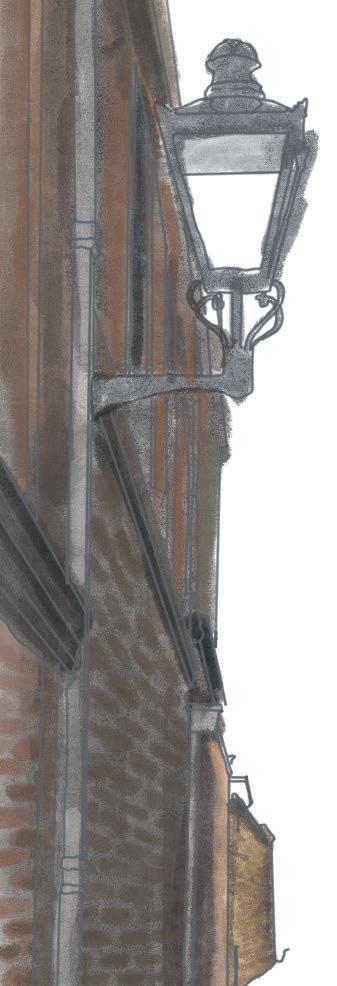
“Aww! Look at that tiny passageway, guys!” utters a wonderfully enthusiastic tourist. Frantically stumbling along King’s Parade on a blistering Saturday morning in early May, this phrase stops me in my tracks. Turning a blind eye to more pressing matters (the embarrassingly ancient pile of dirty clothes back in my room), my feet become sentient. ey lug my laundry-panicked, supervision work-anxious mind into the cosy con nes of St Edward’s Passage. is feels good, I think, as the adjacent Georgian bricks shelter me from the sun’s wrath — and my laundry. is has happened before. On many a brisk walk home, I have found myself loitering in one of Cambridge’s numerous tiny streets. Whether jumping to catch a glimpse of a graduation ceremony in Senate House Passage or admiring the neo-Gothic windows of All Saints Passage, spending time in passageways — passaging, if you will — has become a fundamental part of my Cantabrigian life. And I will even be so bold as to say that these crevices are a fundamental part of Cambridge’s being such a ne place in which to study. Why? Partly because they provide the antiquarian with a perfect eld day. Cambridge has, of course, a surplus of architectural features that make one feel like a medieval monk. Towering gatehouses, itchy gowns, Latin dinner graces, vellum manuscripts aplenty in our old libraries — it’s a noble reward for all the hours spent memorising Othello quotes
at A-Level. But the passageways take this experience one step further. As the City Council put it in 2016, in reference to fourteenth-century St Edward’s Passage, they “preserve a sense of the cheek-by-jowl nature of the early town”. In other words, the streets allow the passenger to soak up the atmosphere of Cambridge’s bustling, not merely its cloistered, medieval past.
Much like visiting the Shambles in York, it is di cult, when nding yourself in St Edward’s Passage, to resist becoming part of a tightly-packed stream of people on a market day. And because of the pedestrianised nature of the passage, you are free from the modern sources of distraction that usually yank you out of al fresco daydreaming. ere is little chance (probably) of being hit by a tyrannical bicycle here. Gone are the Instagram noti cations, the emails, the laundry baskets, and the Google Docs suggestions. All that remains are birdsong and teaspoons clinking, framed by a delightful mishmash of architectural styles.
As his 1658 e Little Street attests, Dutch painter Vermeer was enamoured by this quality of petit streets. In that work, the street’s narrowness forces us to examine the minutiae of life. As the right-hand building collapses — almost with a sigh — into a modest, enticing alleyway, our minds undergo recalibration. Forget the world and its stressors, it instructs us: What exactly is that lady in white crafting? What is the other lady washing in that barrel?
A similar process occurs on Trinity Lane. e soaring, gargoyle-buttressed, nineteenth-century north range of Caius gently ushers the pedestrian
toward the rugged bricks of Trinity’s medieval Nevil’s Gate. Now in a showdown with the two “CLOSED TO VISITORS” signs at the end of the street, a rewind is certainly in order. What on Earth are those patches of cheap red brick doing on a piece of Trinity? Are those gargoyles giving Trinity the metaphorical nger? Little streets, in short, make us better observers.
Here lies the most rewarding part of visiting small passages. Gently, if a little hypnotically, inducing us into a detail- nding bender, these spaces encourage us to discover and try new things. When I walk down St Edward’s Passage, for example, I nd it testing not to wander into e Haunted Bookshop or St Edward King and Martyr Church, the “cradle of the [English] Reformation”. Replacing such distractions as egotistical BMW drivers with an abundance of enticing new spots, the tiny street leads one o course.
For many Cambridge students, myself included, it is di cult to truly let loose. Essay deadlines, supervisions, and laundry naturally take priority over mindless wandering. But spending some time, even for a few minutes, in the caring hands (or, should I say, walls) of the city’s tiny streets unleashes one’s subconscious curiosity — just the kind of faculty that will aid you in nailing that tricky proof, or working out what that Kant bloke was knocking on about. Can tiny streets, then, be art? If art is loosely de ned as any human creation that conveys emotional or creative ideas, I would vehemently say yes.
JESSICA LEER ▶

Keir Starmer didn't like being
stared
at
by a painting of a woman; but maybe that's not up to him, argues Pollyanna Chamberlain
Keir Starmer recently removed a painting of Margaret atcher from Downing Street, and who can blame him? Unlike we might hope, he supposedly didn’t remove it because of Maggie herself but because he doesn’t like pictures of people staring down at him. He didn’t like her gaze. He didn’t enjoy being perceived. We look at art all the time, so what’s wrong with those pieces that stare back? Why not give those in the painting, especially historical or ctional women trapped inside them ( atcher excluded, maybe), a little agency?


e ‘Hesitant Fiancée’ by Auguste Toulmouche has become a meme epitomising feminine rage. Women and girls all over the internet have taken the bride’s de ant stare and reworked it to express their personal, deeply feminine experiences. e bride gazes angrily at her viewer, asking for an escape from the world that the male artist has made for her. This reappropriation has taken the painting’s power from Toulmouche and placed it into the bride’s hands. e torch has been passed from man to woman.
❝
Usually, men can gawk at nude women in paintings, and avoid confrontation
Male control and behaviour enrages us and Toulmouche depicts just that. Manet, however, seems to have a penchant for depicting another common emotion that women experience when encountering very male behaviour: boredom. Mansplaining is real. Arrogance is dull. In ‘Luncheon on the Grass’, Manet paints a woman lazing naked at a picnic with two fully-clothed men who are deep in conversation, seemingly unaware of their nude companion. e woman gazes out of the painting, locking eyes with her viewer. We should be made to feel like voyeurs to her open sexuality, her male artist fetishising her naked body by contrasting it to these clothed men. But her expression is one of boredom.

Usually, when women are shown to be naked by their — let’s face it, male — artists, they do not gaze back at us. e viewer can gawk to their heart’s content but avoid confrontation. As the subject expresses her boredom, Manet allows us to interact with this nude woman in a way that transcends the sexual. We are invited into her intellectual world and not her physical one.
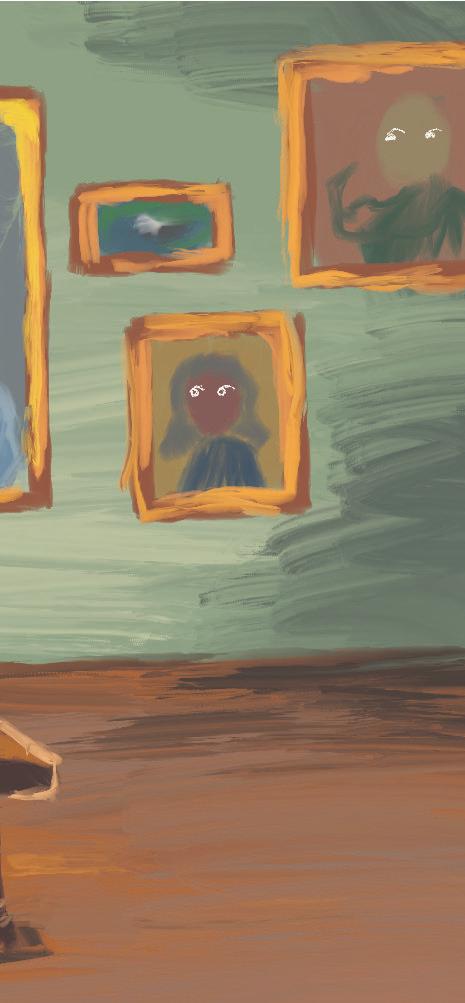
sudden agency rouse their discomfort? For Sir Keir, discomfort was the primary emotion. Paintings by women can be read very di erently.
Vigée Le Brun’s self-por-
Élisabeth Vigée Le Brun’s self-portraits gaze at their viewer, warmly inviting them to admire her work with her soft smile. e portrait of herself and her daughter Julie, again, shows two female subjects staring out of a painting. Unlike in paintings by men, there is no reproach or yearning in their eyes, but genuine happiness.


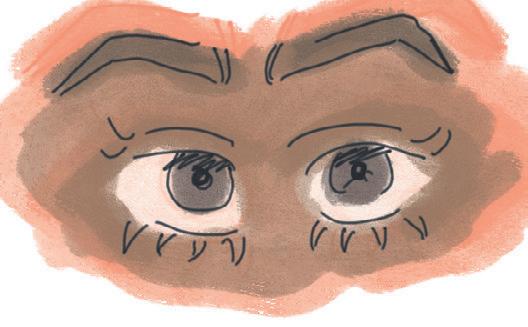
ortable
It is Goya’s ‘Naked Maja’ who invites us into her physical world. Lying nude, pubic hair on show, arms behind her head, the subject gazes knowingly outward. Goya’s painting is confrontational and was therefore controversial. e artist was dragged to trial by an angry mob for his moral depravity. e woman’s bodily autonomy was a shock to eighteenth-century senses and her enticing yet admonishing gaze led a man to inquisition. But all these paintings are by men! No matter how much agency we attribute to the women in them, no matter how uncomfortable they might make their audience feel, they were painted to satisfy the male gaze. Do men enjoy women looking back at them? Or does their boldness and

❝
Maybe it’s good for us to be stared back at once in a while
Feminist author Simone de Beauvoir found le Brun’s portraits to be narcissistic, accusing the artist of endlessly portraying her “smiling maternity”. Given the delightful contrast le Brun’s depictions of the female experience o er to depictions by male
artists, de Beauvoir’s comment seems harsh at rst. Other women artists, however, do not create such glowing accounts of womanhood. Artemisia Gentileschi depicts women in powerful and often violent roles. Her heroines are engaged in action and not distracted by the fourth wall. Does this render le Brun’s smiling women products of the male gaze? Do they gaze at us as though they must always please their male viewers? Or was de Beauvoir too critical of a happy woman who simply enjoyed being a mother?
d epicts w omen
Art is for our pleasure — or displeasure if you hate galleries — but we never stop to consider how paintings look back at us, unless directly confronted by it. If Keir Starmer found being perceived by someone, a woman no less, unnerving, then think of all the (more favourable) women in art who have found being perceived cruel or voyeuristic. Maybe it is good for us to be stared back at once in a while. It reminds us of the harm of objecti cation. Art itself may be an object waiting for perception, but the women depicted in it are not.
McDowell and Annia Krzoska

When searching for o ine fashion inspiration this autumn, look no further than your kitchen cupboard. What could be more autumnal than a cosy cup of your favourite hot drink? We took on the challenge of translating our favourite teas, from the classic Earl Grey to the subtle nettle, into out ts that encapsulate what is so special about autumnal fashion.
Nettle tea is green tea’s more subtle younger sister; gentle and naturally caffeine free, it is the perfect companion to an evening essay crisis. Autumnal out ts do not have to stick to the classic darker browns and reds that they are so famous for. Ultimately, autumnal fashion is about comfort and warmth above all, which makes the soft fabric of the light green corduroy trousers both a comforting antidote to the colder weather, and a nod to the calming colour of nettle tea. e oral motifs in this out t, from the ower details on the cardigan to the lily of the valley earrings, are a reminder that spring and summer will one day come again.


Yes, Christmas is still a few months away, but Bridgemas is approaching us at breakneck speed! Mulled wine- avoured tea might sound odd, but it has been tried and tested by the past supervisees of one well-stocked (when it comes to tea) Medieval Literature supervisor. Taking inspiration from the tea’s dark red colour, a mulled wine tea-inspired out t incorporates a lot of maroon and some gold accents.






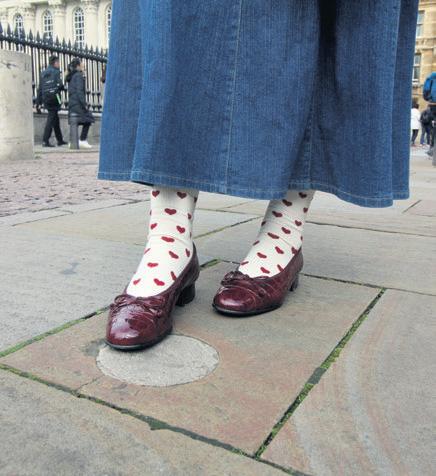


We begin with a staple herbal tea: very berry. In all its incarnations, the berry tea has a sweet taste that is nostalgic for a summer just passed. e same can be said for its fashion incarnation. e essence of this out t is translated with or without the coat, which is both practical for the ever changing early autumn temperatures, and a re ection of the transitional taste of this tea. With sweet nishing touches, such as heart patterned socks and soft pink trimmings on the trench coat, juxtaposed with the bolder hues of the denim skirt, this out t captures the feeling of drinking a comforting cup of very berry tea on the rst cold day of the season.



Without a doubt the rich avour of Earl Grey — and of course its regal name — lends itself to dark academia-inspired out ts. is out t incorporates the classic academic silhouette with muted greys and greens reminiscent of late Autumn nights. e subtle gold accents, like the shoe buckles, evoke Earl Grey’s uniquely strong taste, and when paired with a warm jumper, they combine to create the perfect cosy yet academic look. But, of course, no Earl Grey inspired out t would be complete without a matching gold candlestickholder-turned-teacup.






is out t combines the fun festivities associated with the beverage with a bit of homely comfort. e maroon jumper, likewise, is loose and comfortable — allowing for plenty of mince pies to be consumed! Gold accessories take inspiration from the dried oranges and cinnamon sticks often used to accessorise the drink that has inspired this tea. And what better way to embrace the cosy vibes inspired by a warm mug of tea than to nd some teari c jewellery to match.


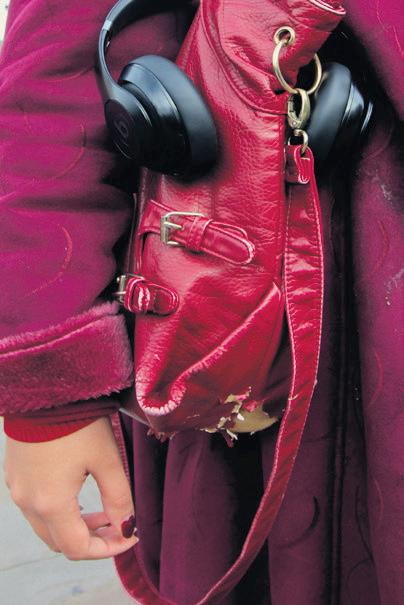



ough lavender tea does exist, it is far more commonly used as a component of ‘sleep’ teas. Like lavender itself, tea-inspired out ts need not be more than a subtle nod to the feeling evoked by a warm drink that you love. Teas that use lavender are comforting and calming, like the soft fabrics that feature in this out t. e rich tones of the purple jumper are complemented by the darker, more muted blues of the jeans and jacket, which bring out the cosy vibes
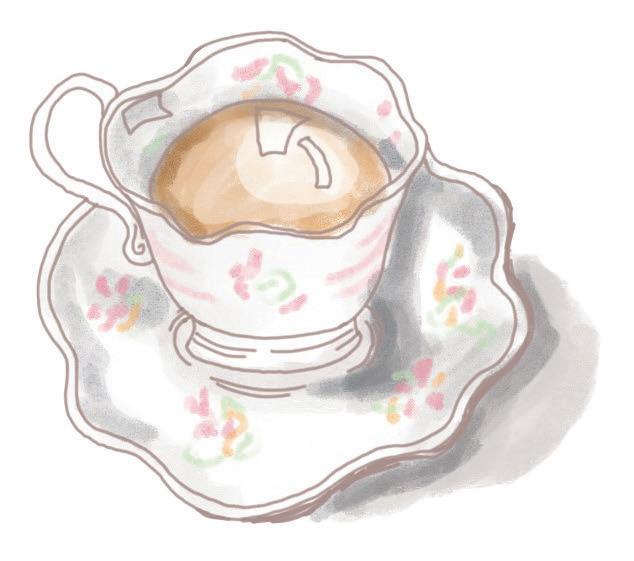
Ismail Sheikh recommends the forgotten TV shows of
decade, from parallel universes to perfect plotting
Heading back into university, many of us rely on our beloved TV shows to keep us sane during the inevitably trying times at Cambridge. However, while we rewatch our favourite sitcoms over and over, we are soon clamouring for something more; once we’ve completed the classics like Game of rones and Breaking Bad we can be left overwhelmed by the seemingly in nite choice of TV shows available.
As a result, I’ve taken it upon myself to create a watchlist of amazing, but criminally underrated, TV shows released over the last decade. ese projects, though (deservingly) highly acclaimed by critics, somehow never broke into the mainstream and ended up buried under the constant swarm of new media. ese are often the most creative, and their innovative storytelling and genre-defying tropes make them real gems. In contrast to big-budget productions that cater to broad audiences, these lesser-known series often experiment with unconventional narrative structures — whether it’s slow-burn pacing that leads to major emotional payo s, or intricate, layered plots with well-developed multi-faceted characters. I hope that these can provide — if not a more enjoyable — at least a di erent viewing experience.
Synopsis: As a teenager, Daniel Holden was convicted of the heinous crimes committed against his girlfriend and spent 19 years on death row until new DNA evidence clearing his name came to light. Returning to his southern state of Georgia, the show navigates his adjustment to life outside of prison, family, and the wider townsfolk across thirty episodes.
Why I recommend: is southern gothic slow burn is the best character study I have seen on television. e pacing is well worth the time you invest as it is deeply meditative, thought provoking, and masterfully handles the emotional beats. e bittersweet tone of the entire series is unique, and is so creatively nuanced I have had no problem rewatching over and over. Fiction appears to mirror reality in the show. Damien Echols of the West Memphis Three, who was released from prison after almost two decades due to newfound DNA evidence in a case much like the show’s fictional one, wrote that he “began to wonder how much of my story had crept into the script”.
Synopsis: Dark is Net ix’s rst original German language series, an intense, complicated, and highenergy thriller set in multiple universes and timelines. e plot follows the consequences of a child’s disappearance across four separate and dysfunctional families, revealing a time-travel conspiracy branching storylines away from the present year to the 1950s and 2052. It navigates the complexities of time and humanity across three seasons with “one of the most shocking and emotional conclusions to a TV show” (Emma Stefansky).
Why I recommend: From the exceptional ensemble case, incredible sound design and score, and award-winning visuals, the show has lots of appeal, but most of all is the wildly original plot and incredibly unique themes executed in a very accessible and engaging way. e BBC named Dark as the 58th Best TV Series of the 21st Century, with season 2 maintaining a 100% score on rotten tomatoes across its 30 reviews.
Synopsis: Inspired by e Crying of Lot 49, this dramedy show follows an ex-surfer (Wyatt Russell, before Marvel fame) called Dud. Despite losing his father and family business, Dud is a disillusioned optimist via whom the show explores community, purpose, and life itself, as he happens upon a lodge full of mystery.
Why I recommend: is is a beautifully philosophical show, ideal for anyone seeking something o the beaten path. Hope, disillusionment, optimism (and pessimism) all resonated with me as a student heading into the new year, but it was overwhelmingly heartwarming and at times very funny. is show can resonate with you long after its conclusion, as its charm and earnestness continues to sit with me.









All four seasons received critical acclaim with the nal season holding a Metacritic score of 99 and a Rotten Tomatoes rating of 100%.
AMAZON PRIME
Synopsis: J.K. Simmons gives an incredible dual-lead performance as a low level bureaucrat and his parallel universe counterpart who’s an accomplished secret agent. e show’s premise is pretty crazy: two parallel worlds are engaging in an increasingly tense cold war, mediated by secret agents and spies, when a powerful rogue out t chooses to take drastic action. We follow J.K. Simmons as he discovers that his tedious government job is actually part of the management of this parallel universe.
Why I recommend: In everything from Whiplash to Spiderman, we’ve all seen J.K. Simmons steal the show, but nothing exes his acting chops more than Counterpart. His incredible dual performance should be reason enough to watch this show, and if not the incredibly unique premise should seal the deal. It is fun, energetic and complex, with a fast-paced yet intricate plot.
APPLE & AMAZON PRIME
Synopsis: Described as the Mad Men of the tech industry, this show covers the decade of the personal computer revolution, and a company that witnesses the growth of IBM and hopes to challenge it with a historical idea.
Why I recommend: Rated the 55th greatest TV series of all time by Rolling Stone, this show is de nitely worth sticking through, with the later seasons being big improvements on the rst. e way the show tackles navigating a cutthroat industry, failure, ambition, and complex personal relationships is to be marvelled. I found the ending season to be one of the best to a TV show that I’ve ever seen, and I hope you all watch it and come to agree with me.


Gina Stock gives an introductory overview of the best films and filmmakers from Spain
Spain has a huge wealth of talented lmmakers and directors, with huge names like Guillermo del Toro making their way rmly into the English-speaking world. e country has pushed the boundaries and covered new ground in lm for decades, with directors like Pedro Almodóvar producing lms that are still studied, talked about and watched frequently decades later. is is a list for anyone looking for an introductory overview of lm and TV from Spain; a starting-point for all cinephiles wanting to diversify their watchlist!
Las Chicas Del Cable (2017): Las Chicas Del Cable centres around four women in Madrid in the interwar period. Being a sucker for a historical drama, I was bound to enjoy this. e series does well in charting the subtle changes in fashion throughout the 1920s and 1930s, and approaches the period with a refreshingly feminist lens, even breaking ground with representations of queerness in this period.
Elite (2018): You have to look past the completely inaccurate portrayal of the high school experience to enjoy this one, but once you do, it’s extremely entertaining. Elite focuses on a group of over-privileged kids at a private school in Madrid, and tips their world upside down when three new students from the local state school join. Elite has sex, drugs, and endless drama, and signi cant queer representation. It explores all sorts of social issues within the context of modern Spain, and has a star-studded cast including Danna Paola and Ester Expósito.
Mujeres al Borde de un Ataque de Nervios (1988): It couldn’t be a Spanish recommendations list without a Pedro Almodóvar lm. Mujeres al Borde de un Ataque de Nervios (Women on the Verge of a Nervous Breakdown) is so fascinating that it has been turned into a musical. Almodóvar’s aesthetic choices are the epitome of 1980s vibrancy, and the script is witty and interesting. is lm in particular is interesting in terms of its portrayal and treatment of women, which is highly complex in a post-fascist context in Spain, and even more so by a male director.
Carmen (1983): Once again, we couldn’t curate an introductory Spanish watchlist without approaching Carlos Saura. Carmen is a particularly haunting example of Saura’s work, which is characterised by a fascination with amenco and choreo lm. Carmen’s intricate intertwining of dance and lm is entertaining and broke new ground. Another example of the prominence of Saura’s work is his lm Blood Wedding (1981), which follows a amenco reinterpretation of Federico Garcia Lorca’s play of the same name. Both these lms are a fundamental must-watch for anyone looking to get stuck into Spanish lm history.
El Sur (1983): With its atmospheric cinematography and delicate storytelling, El Sur captures the emotional weight of a divided country and the generational impact of untold stories. Víctor Erice is another director operating in the post-fascist context of the Pacto Del Olvido, the bipartisan pact to forget about Franco. is poetic lm o ers a deeply introspective look at both personal and national histories. It’s a must-watch for those who appreciate nuanced, slow-burn narratives.
Despite being two years old, Airbuds has recently experienced a meteoric rise, drawing in thousands of new users with its distinctive blend of music habit-sharing and real-time social interaction. Boasting over 47,000 reviews and a glowing 4.8 star rating on the App Store, the app has clearly struck a chord with a young, music-obsessed audience by transforming
friends, providing a running auditory commentary on your study sessions or evening strolls back from Sidge. It’s as though the app took the voyeuristic charm of Spotify Wrapped and made it omnipresent, giving your friends unfettered access to your listening habits.

the solitary act of listening into a shared, public event. Each song you play is instantly visible to your comment
But in an age where social media has in ltrated nearly every corner of life (because, obviously we weren’t sharing enough already), Airbuds raises a compelling question: does this heightened visibility encourage more authentic listening, or are we simply curating our playlists to project a certain image, driven by the silent pressure of constant surveillance?
At its core, Airbuds is like the overly ca einated cousin of Spotify’s friend activity feed. It doesn’t just show you what your friends are listening to; it does so in real time, letting you jump into the same vibe, comment on their song choices, or even toss in a cheeky Orwellian-style sticker to remind them that yes, you can see they’re playing ‘Pink Matter’ by Frank Ocean for the tenth time that day. For anyone who thrives on the intersection of streaming and social validation, Airbuds provides the perfect tool to keep tabs on your friends’ musical tastes — all at the low, low price of letting them keep tabs on

passive observation. No, Airbuds is far more ambitious. Each week, the app compiles a personalised music roundup — a snapshot of your most-played tracks, forever two taps away from being dropped into your group chats. (Cue your friends debating intervention techniques because you’re still listening to that one British-looking guy with the sunglasses singing about the ‘gurlz that do druhgz’.) It’s a fascinating twist on the annual Wrapped ritual that doesn’t come just once a year; instead, it gives your friends an ongoing look at who you are musically, and — let’s be honest — how you want them to see you. And while it’s tempting to view this as yet another way to curate our personas, there’s something more profound at play here.
all just lean into our unashamed love for the Glee soundtrack because, really, who can keep up appearances under 24/7 surveillance?
Music, at its heart, has always been social, and Airbuds simply turns up the volume on that conversation
In today’s hyperconnected world, music has become another form of social currency. Much like the TikToks we repost or the clothes we wear, the songs we play contribute to our personal brands. Airbuds takes this to the extreme, o ering complete transparency into our musical choices. Now, every song queued is another obnoxious brushstroke on the canvas of your personal identity. In short, the social media- cation of music has arrived, and suddenly even your guilty pleasure throwback to Mr. Brightside carries social weight.
❝ It’s as though the app took the voyeuristic charm of Spotify Wrapped and made it
omnipresent
Of course, this kind of visibility has its e ects. Some argue that Airbuds turns listening into an exercise in performativity, carefully curating your song choices to appear more musically enlightened than you are.
But this isn’t just about
EZRA IZER
But others say the opposite: with every track on full display, the e ort needed to maintain a pretence becomes too draining. Eventually, we might
Here’s where Airbuds throws us a delicious paradox: it actually pushes us towards authenticity by exposing our every minuscule musical instinct. e pressure to constantly perform might back re, leading us to abandon the need to project a certain identity and embrace our raw, un ltered interests. at said, performativity is still very much alive and well. Knowing that our listening habits are public domain might lead us to shove our hyper-pop favourites aside for delicately selected indie tracks. If we’ve mastered the art of curating Instagram grids, why wouldn’t we extend the same energy to our music feeds?
Still, the real kicker is this: in a world where everything is shared, it’s not just the songs themselves that matter — it’s the interaction around them. Music, at its heart, has always been social, and Airbuds simply turns up the volume on that conversation.
Airbuds also signals a move away from algorithm-driven discovery. Instead of being fed recommendations based on your listening history, you’re interacting with new tracks through a feed of what your friends are playing in real time. is more collaborative, human-centric process is something of a return to the days of exchanging mixtapes, only with the modern addition of subconscious sharing, where your choices are broadcast whether you like it or not.
As we embrace this era of ever-visible choices and immediate reactions, Airbuds might very well represent the future of how we experience music. Whether this heralds a new era of sonic sincerity or just more noise, well, that’s for your next listening spree to decide.
Notoriously, the start of term is an insanely busy time, which leaves very little time for music events. But fear not! We’ve compiled a list of events that spreads right throughout the term, so you can take a muchneeded night o now and catch the live music later.
e Fiver - 18 OCTOBER
Cambridge Junction o ers the chance to break out of the student scene by featuring a series of emerging, local bands on the main stage. A regular feature at Junction, the organisers have developed a keen ear for bands that are worth listening to, while giving new artists their rst taste of a professional gig.
Big Band Roulette - 19 OCTOBER
A familiar nightmare: you’re on stage performing to a crowd but you haven’t rehearsed, and you don't know your bandmates. at’s exactly what Big Band Roulette is. Every performance brings together a randomly selected set of musicians from a talent pool and o ers them only one day to rehearse the brand-new setlist. Sounds terrifying to do, but it’s incredible to watch!
Cambridge University Schola Cantorum Compline - 21 OCTOBER
Following the controversial axing of St John’s Voices last year, Schola Cantorum has arisen from the ashes as an all-gender alternative open to members of any college. Every Monday, the group will perform compline at a di erent chapel or church. e service is open to anybody, with no need to book, so if you’re seeking an evening of relaxation, contemplation, and gorgeous-musicenjoyment-ation, then come along.
Little Simz - 26 NOVEMBER
Originally from Islington, Little Simz has become an unmistakable voice in the British rap scene, with a Mercury prize, a BRIT award, and a Glastonbury pyramid stage performance under her belt at age 30. Now she is set to appear at the Cambridge Union on November 26 to give an interview and Q&A open to Union members. If you haven’t forked out the dazzling £180 annual Union membership, I suggest you get yourself on Hinge and nd
somebody to take you as a guest, because this is a chance you don’t want to miss.
Noasis - 26 OCTOBER
After selling out the venue in February, one of the UK’s most wellknown Oasis tribute bands is returning to MASH. No need to mourn the extortionate pricing and unprecedented popularity that might have kept real Oasis tickets out of your hands, you can catch this lot for just £17.60.


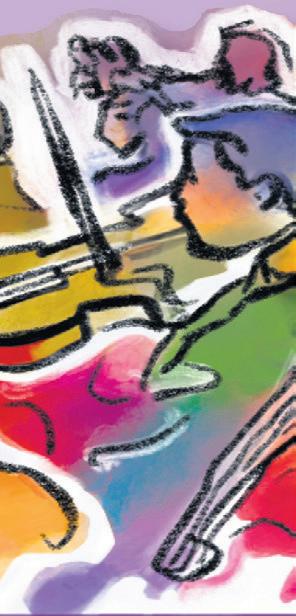




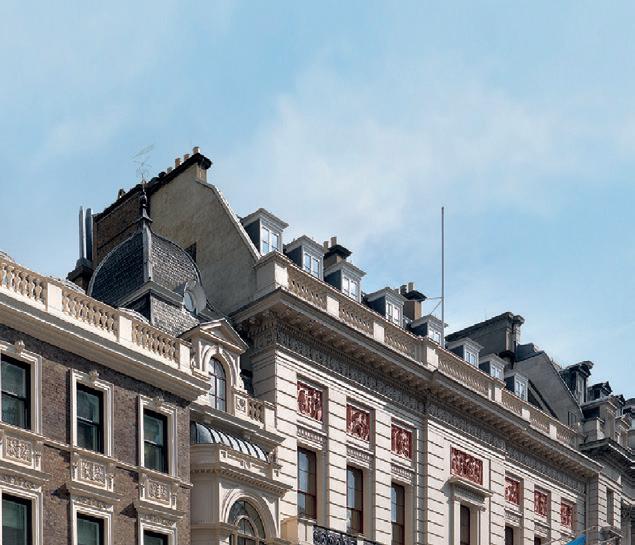



For nearly 200 years alumni have chosen to take up membership of a spacious and elegant private club in the heart of London. The Oxford and Cambridge Club in Pall Mall is the perfect place to meet for a drink, entertain friends and colleagues in magnificent surroundings, play squash, take a break, host a party or just find a quiet corner to prepare for a meeting. A thriving social scene, sports facilities, a lively calendar of events including talks, tastings, dinners and balls, an exceptionally well-stocked library, extensive wine cellars and more than 40 bedrooms mean our members use their club for recreation, relaxation and business - and now you can too. For details on membership or a tour of the Club house on Pall Mall, please visit www.oxfordandcambridgeclub.co.uk or call 020 7321 5110 Oxford and Cambridge Club @oandcclub Welcome
Last term’s audition season during May Week was perhaps the most chaotic time in the scope of Camdram casting. Auditions and recalls were held in a span of a few days, and self-tape extensions were all the more relied upon. e sudden quiet as I returned home for the summer and had to wait on casting decisions was certainly unnerving, until checking my Cambridge outlook became a less and less regular occurrence. en the email came: I had been cast in a week ve show at the Corpus Playroom, Negotiating With the Dead. I was relieved to have a show in the diary for Michaelmas, let alone one with such a fun name.
e synopsis of Negotiating With e Dead seemed right up my classicist alley — the show is about a group of archaeologists who nd an invented artefact called the Templar’s Cross linked to the Crusades. As the play dives into discussions surrounding religion and its manipulation for political gain, the action splits between modern day and the historical Crusades. I was very glad to be cast as Aliya, one of the archaeologists involved in the project. Some of my friends had been involved in the rst run of the show last year at Pembroke New Cellars, and from their anecdotes I was very excited to be cast in this developed version of the play. Since my most recent Camdram exploits had been more traditional
texts (Shakespeare and Sophocles were my allies in theatre last term), I was also glad to make a return to the world of student-written drama, especially since my rst ever production in Cambridge was a student-written show called Etheridge at Pembroke New Cellars.
Like our last edition of the Camdram Diaries by my fellow editor Elsie explored, there is a di culty in retaining momentum when there is a three-anda-half month gap between casting and the beginning of rehearsals, yet given that the show is in week ve, it made sense for rehearsals to begin once everyone had arrived in Cambridge. is didn’t stop our director though, who was very on it in creating the cast WhatsApp and kept the show’s Instagram alive and intriguing. Weekly Facebook posts were uploaded on the Cambridge eatre group, meaning our prod team has been expanding by the day. I was further elated to discover that so many of my fellow Camdram warriors were also involved in the show, and we immediately messaged each other to express our excitement about working together. Whilst one cast member had previously been one of my directors for Twelfth Night in Easter term, for another this is our third production together. My theatre experiences last year were a wonderful way for me to meet new people with the same interests as me, yet there is a comfort in knowing that this time round I will be able to walk into a rehearsal room






with familiar faces smiling back at me.
As a cast, our holiday workload involved one read-through of the script over Zoom. It was lovely to see everyone’s faces over screen, including our AD Olympia who joined the project after the audition cycle. It was comforting to have the scriptin-hand so early on (the start of August!), and to get a gauge of the role of my character as a whole within the production. One cast member messaged me during the readthrough to express how much they had already fallen in love with the script, and it is this positive and enthusiastic
environment which has already been established that will carry us forward and hopefully save us from the week ve blues.
Since everyone has made their triumphant return to Cambridge, it’s time to press the accelerator


As for now, since everyone has made their triumphant return to Cambridge, it’s time to press the accelerator. Our teaser trailer has just been released; the cast group chat has once again come alive. A calltime has just been sent out, and all the memories of scheduling rehearsals amid my timetable have come owing right back to me. I am not a fan of empty days (I will procrastinate my work even more than usual), so an impending rehearsal schedule is exactly what I need to renew my work ethic. In-person rehearsals begin next week, leaving plenty of time for us all to meet each other, play around with our roles, and immerse ourselves in the script before we take to the stage in ve weeks’ time.



Romilly Norfolk discusses how the Varsity Ski Trip may not be as a ordable as people think ❝
Michaelmas brings colder weather and the reminder that winter is coming. For some that means wet weather and a Christmas dinner, for others that means ski season. At this university, and our friends in the Other Place, the Varsity Trip o ers the chance to go on a pre-organised skiing trip. e selling point is that the trip is at “student prices” but with the base price (including coach travel) being £558 without addons, what types of students are they really aiming this trip at? e answer is those who can splash the cash.
e largest issue with the ski trip is really an issue with skiing holidays in general: those who are less privileged (and thus less likely to have gone skiing before) will always end up paying more. is is because those who don’t ski much will have to rent ski gear, this goes beyond skis, boots and poles, and can include coats, gloves, helmets, and goggles. Renting skis, poles, boots and a helmet will cost one person £115 for the week, and that’s only the basic supplies.
What the trip really pro ts o of is all the extras you may feel pressured to indulge in
clothing is also recommended on the cold slopes, it might be good
for some who have a North Face lying around but for many a college pu er isn’t going to cut it. Renting is again the far cheaper option but even just a set of gloves, a coat and skiing trousers will put you back about £65. is doesn’t even include the several layers you’ll need underneath and the fetching goggles you’ll be sporting all week. e trip provides a lot of this rented gear at a lower price than if you were to do it privately, but
Now what if you’ve never skied before? Fear not, you can also get lessons when you’re on the trip.
Six hours of beginner lessons last year would cost you about £150. So you better hope you’re a fast learner or have some patient friends who are willing to teach you.
You’ve
never skied before?
at’s another £150
ese are only the charges you’ll need to incur if you’re a newbie to the slopes. What the trip really pro ts o is all the extras you may feel pressured to indulge in. Accommodation is provided in the base price of a ticket, but with apartments varying in capacity from six to 16, many choose to upgrade. eir website boasts that the upgraded accommodation sells out fast and you can see why. Even in the typical four to six person apartments, people will have to sleep in alcoves with bunk beds, share doubles or draw the short straw and kip on the sofa bed. Upgrades will either cost an extra £79 or £149 if you want the even nicer option (no sofa bed for you).
If you think the Varsity Ski Trip is all about skiing you are sorely mistaken.
Any person who has had the unfortunate experience of being a member of Ticketbridge during the trip knows it’s also about the events. Every night of the trip there is a night-time event, from the classics of a silent disco to the fun of skiing back down from mega apres, you can certainly ll your evening calendar.
ese events can cost from as little as £6 to £35 (based on last year’s prices) depending on the event. More extras which you don’t need but you might feel a little
Now let’s not forget the most important extra: food. e trip provides vouchers and discounts in some restaurants in the resort but for those trying to work on a budget this may not be the best option. e Varsity trip website says: “If you are cooking for yourself most days, having bought ingredients in the out of town super-
market or from home, [budgeting for meals] can be done quite cheaply.” But the notion of bringing a week’s worth of food from home to cook for yourself is a little far-fetched, and the website gives no indication of the distance or cost of the “out of town supermarket”.
So the lure of a £349 base price quickly spirals up. An extra £209 for the 20 hour coach there and back (you could spend an extra £100 and y instead). And now you’re at the higher base price of £558 that we started this article on. But let’s assume your part of the normal portion of the population that doesn’t own ski equipment and clothing, that’s another £180. Some extra layers will put you back another £80, for spares in your base layers and some mid layers. You’ve never skied before? at’s another £150. Let’s assume you and all your mates are okay bunking up and you don’t upgrade your accommodation. Now we will add two night-time events just to add a little fun and call that £15. We will also guess that you are very strict on your budgeting and will cook all your meals, let’s budget £50 for that shop. So your bargain £500 skiing trip is now looking at being over a grand.
e Varsity Trip is often painted as an easy, a ordable and accessible way to go skiing but it lacks so much transparency about the actual cost of it all. Many don’t realise how much the trip is going to cost them until they’re speeding through their 30 minute booking slot and seeing the price rack up.
Now the trip does provide a cheaper skiing holiday, especially for the popular resorts the trip frequents. When a lift pass alone for the week in Tignes costs over £230, you can see why the base price is already so much. But if you really want to go on a cheap skiing holiday with your friends, you’re probably just as well o choosing a cheaper resort and organising it yourself. And if you do that, you won’t have to deal with Oxf*rd students either.

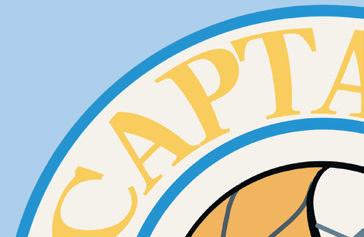



1.Who is your sporting idol?
Alan Shearer, I’m a massive Newcastle United fan. In a water polo context probably Denes Varga, he’s such a unique player and so fun to watch. It’s always dangerous seeing match highlights of him though because then you go into training thinking you can try some of the stu he does, it very rarely goes well.
2. Best sporting moment?
Winning Varsity against Oxf*rd in 2023. ey had won Prem South that year and came into the match incredibly condent. Once the match started the condence didn’t last long.
3. Worst sporting moment?
Losing Varsity last year by one goal. It was an incredibly close match but just couldn’t get it over the line.
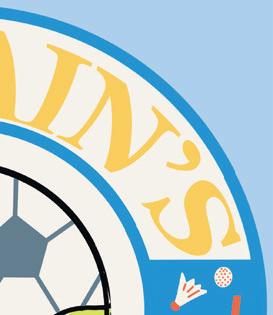

7.Worst bit about being captain? Losing.
8. Is it tricky to balance sport and work?
It de nitely can be di cult, but I think they feed into each other. I always feel a lot better physically and mentally in season with consistent training/matches and that usually translates to me being more e ective at work.
9. Is it easy for beginners to join?

Water polo has been a massive part of my life since high school. e community is relatively small, but the vast majority of folks involved are great. e sport fosters a lot of camaraderie and most of my best friends and closest relationships are in some way related to water polo. Sport is also just a great way to destress
All in all, many nd the trip fun, and I’m sure it is. But I think it shouldn’t try to pretend it’s not any di erent from a normal skiing holiday, only for those with too much disposable income.

5. Pre-game/competition/
Nothing in particular, just get out

6. What is the best bit




Absolutely, lots of team members started playing the sport when they rst came to university. It’s a great group of guys and we try to foster a really inclusive and supportive environment. e team has signi cantly grown in size year after year that I’ve been here which I think is a testament to the fact that folk want to stay around and be part of the squad even if they aren’t coming in with a wa-
10. What does a typical training session look like?
Typically, we start with a swim or leg set (or sometimes both if I’m in a bad mood), and then go on to passing, shooting, and technique drills. Often, we’ll then work on a speci c aspect of team tactics that we want to emphasise and nish with a training match to re-enforce what we worked
Watching the e ect of coaching, seeing players and the team getting better as the season progresses. e jump in ability from the beginning of the year to end can be massive and it’s a reprocess to be a match
11. Season predic-






A lot of the team from last year is coming back and we have some exciting freshers coming through, so hoping for a dominant season for both the 1s and the 2s.



Captain’s Corner pg. 31


pg. 31

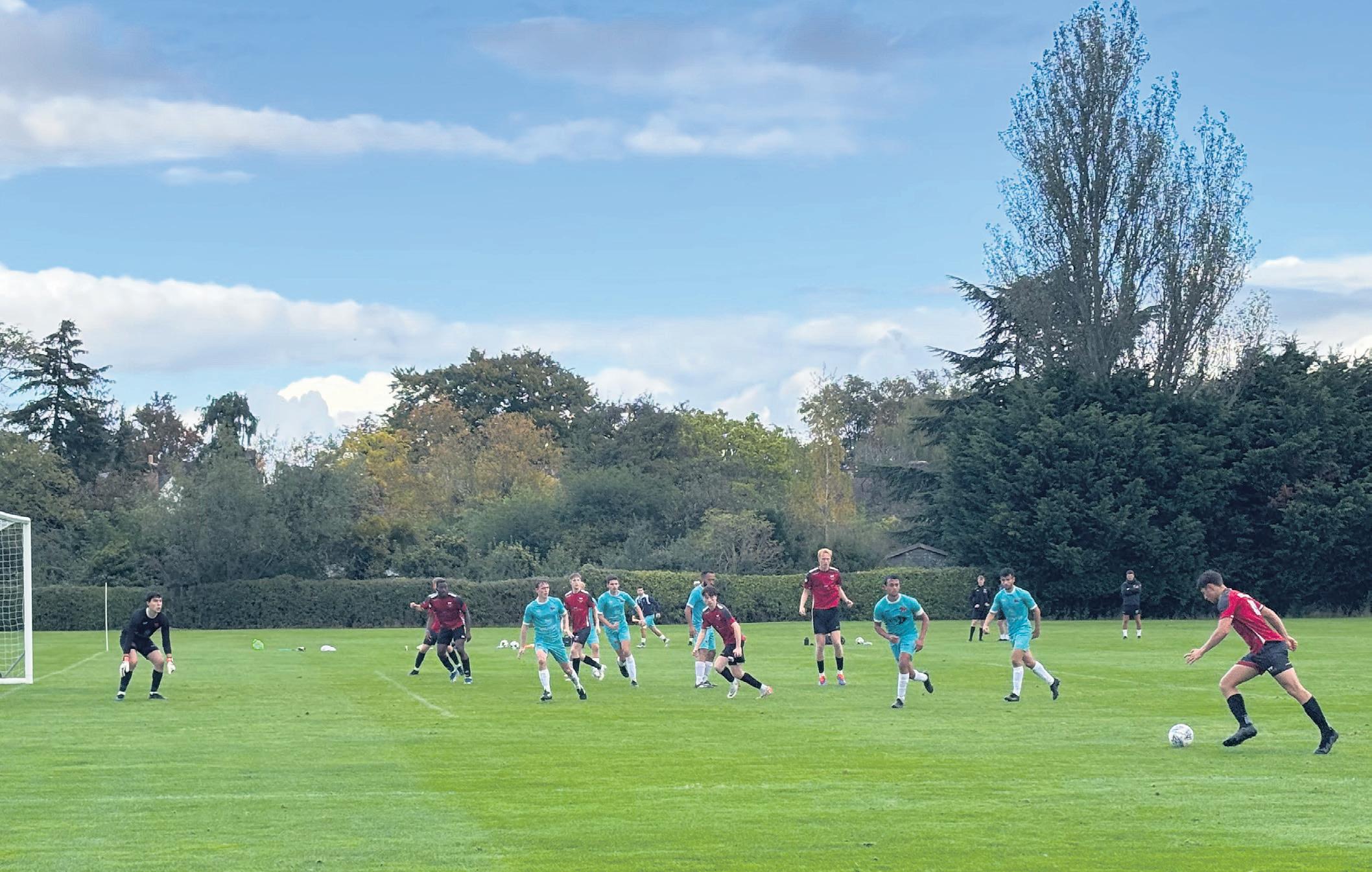
Will Jonas Sports Editor
ere may have been smatterings of rain falling around Queens’ College sports ground on Wednesday, but there was a little sunshine through the solemn clouds. e Cambridge Men’s Blues were opening their season against Warwick, and there could be no better start to the year than three points. Yet, this scene accurately portrayed a pathetic fallacy about Cambridge’s performance; mostly glum, and a little bit wet, but with rays of hope and optimism to demonstrate that there is no reason why they cannot do well this year in BUCS.
Captained this year by Reece Linney, the Blues started well in damp conditions and controlled the rst quarter, as Warwick attempted to keep them out.
However, the pressure soon told as Aaran Mehmood slipped Asa Campbell in on goal, and the latter clipped the ball delightfully past the oncoming keeper to open his, and the team’s, account for the season in the 22nd minute. Mehmood, who was devilish and excellent all game, could have helped double the lead shortly after, but chose not to play the nal pass and instead shot wide. is Cambridge dominance was rarely challenged in the rst half, the best Warwick chance being a corner that missed everyone and rattled o the post. A couple of chances went begging at the end of the rst half but nonetheless, a satisfactory start from the Blues.
Never has the adage ‘a game of two halves’ been more prevalent. Warwick had a newfound con dence that meant
Cambridge found themselves on the back foot, and Warwick had handball appeal. Sure enough, just past the hour mark, Warwick equalised after some sloppy defending. is was the Blues’ rst test of what is sure to be a challenging season, and things began to fall apart from this point. Five minutes afterwards, another goal for the away team materialised in a scrappy passage of play where some de ections took the ball past an unfortunate Aram Sarkissian. e next goal, however, could not be attributed to bad luck.
After Warwick had taken the lead, their captain could be heard telling the team to be “aggressive” and to “go back to basics”. Perhaps Cambridge should have heeded his words. In a complete moment of madness, a Cam-
bridge substitute stepped onto the pitch and caught the ball, assuming it had gone out. It had not. e resulting free kick was launched into the Cantabridgian box and headed back to a mid elder standing on the edge. He trickled a tame e ort towards Sarkissian, who had had a decent game up to this point, and it went through his legs and in to make it 3-1. It was an extremely humbling moment for Cambridge, who brought on fresher Jesse Tapnack to change the dynamic. However, it was to no avail. Cambridge pulled one back after a careless challenge from Warwick allowed Deniz Ozer to nd the corner from the penalty spot in the 87th minute. But Warwick hung to claim an overall deserved win. Cambridge had strong periods but lacked the discipline to hold onto the lead they
had earned. Coach Tom Blatch will have plenty to think about for the Blues’ next game, and hopefully, they come with a stronger mentality to push for a win as they start the 2024-25 season. I’m sure, past all the rain and gloom, there is somewhere over the rainbow for this team.